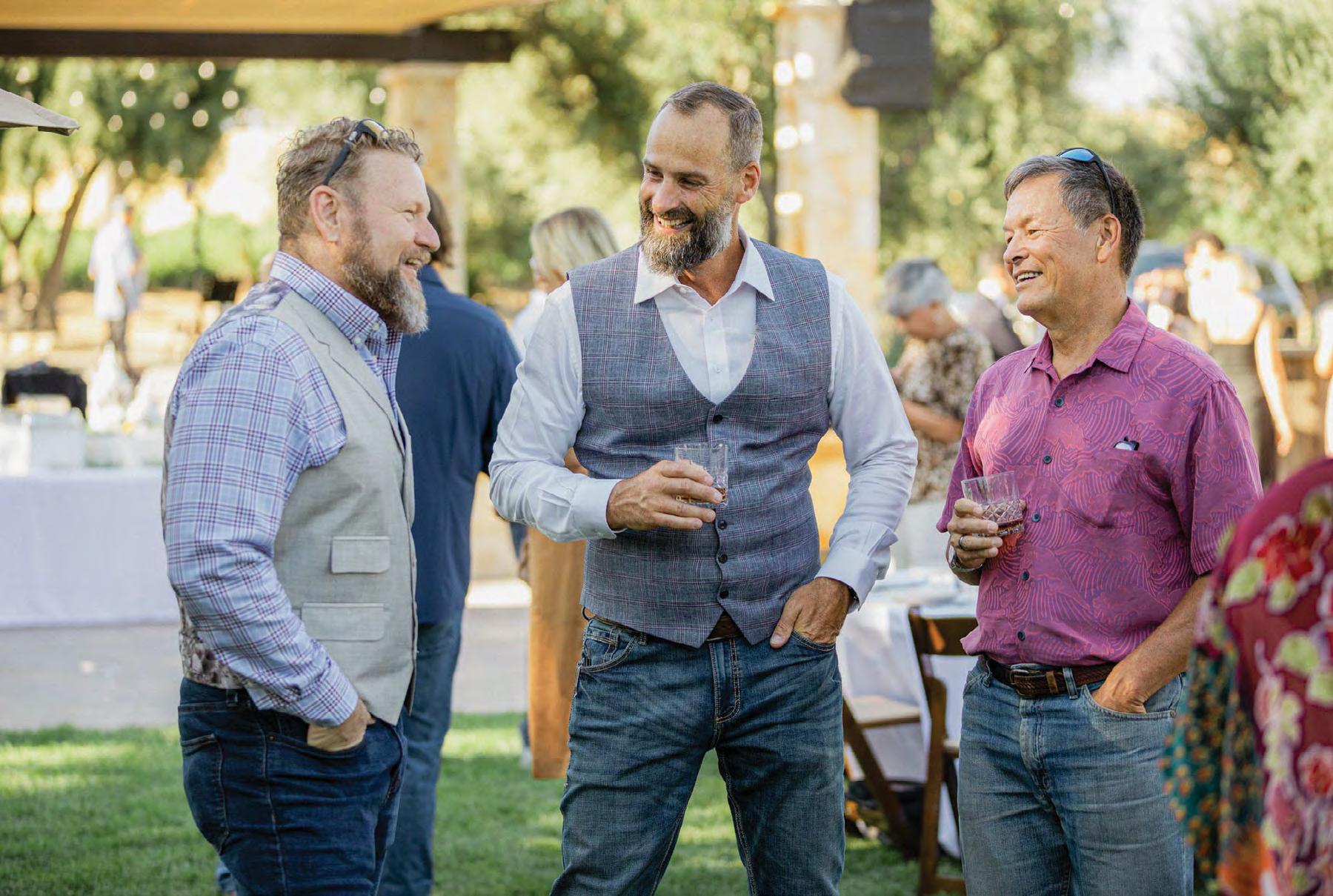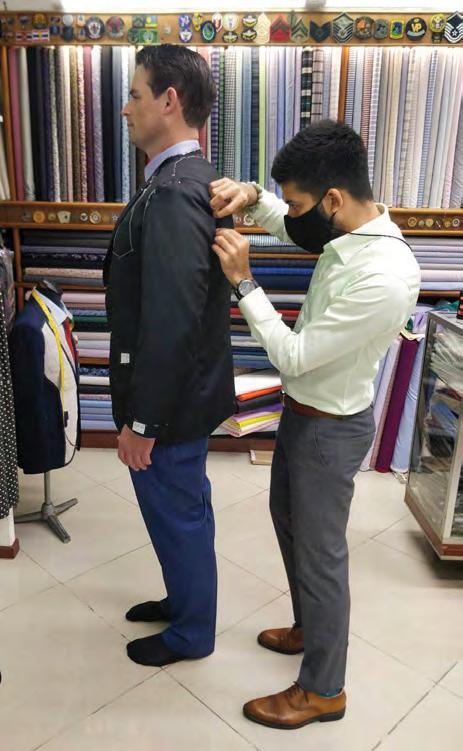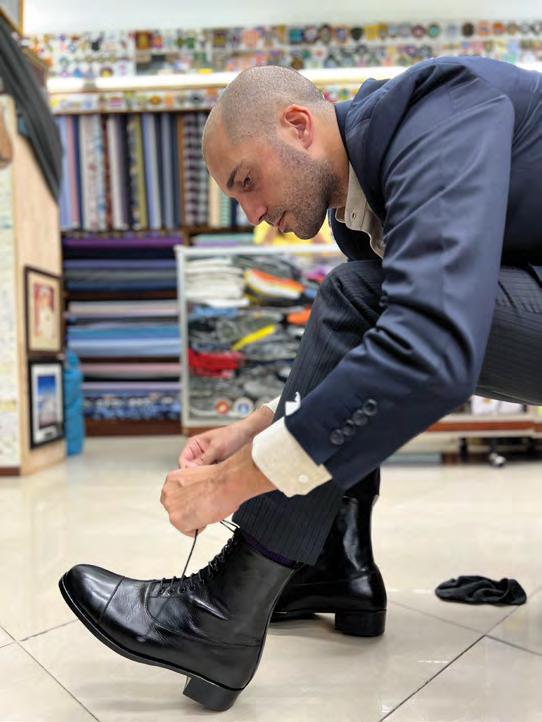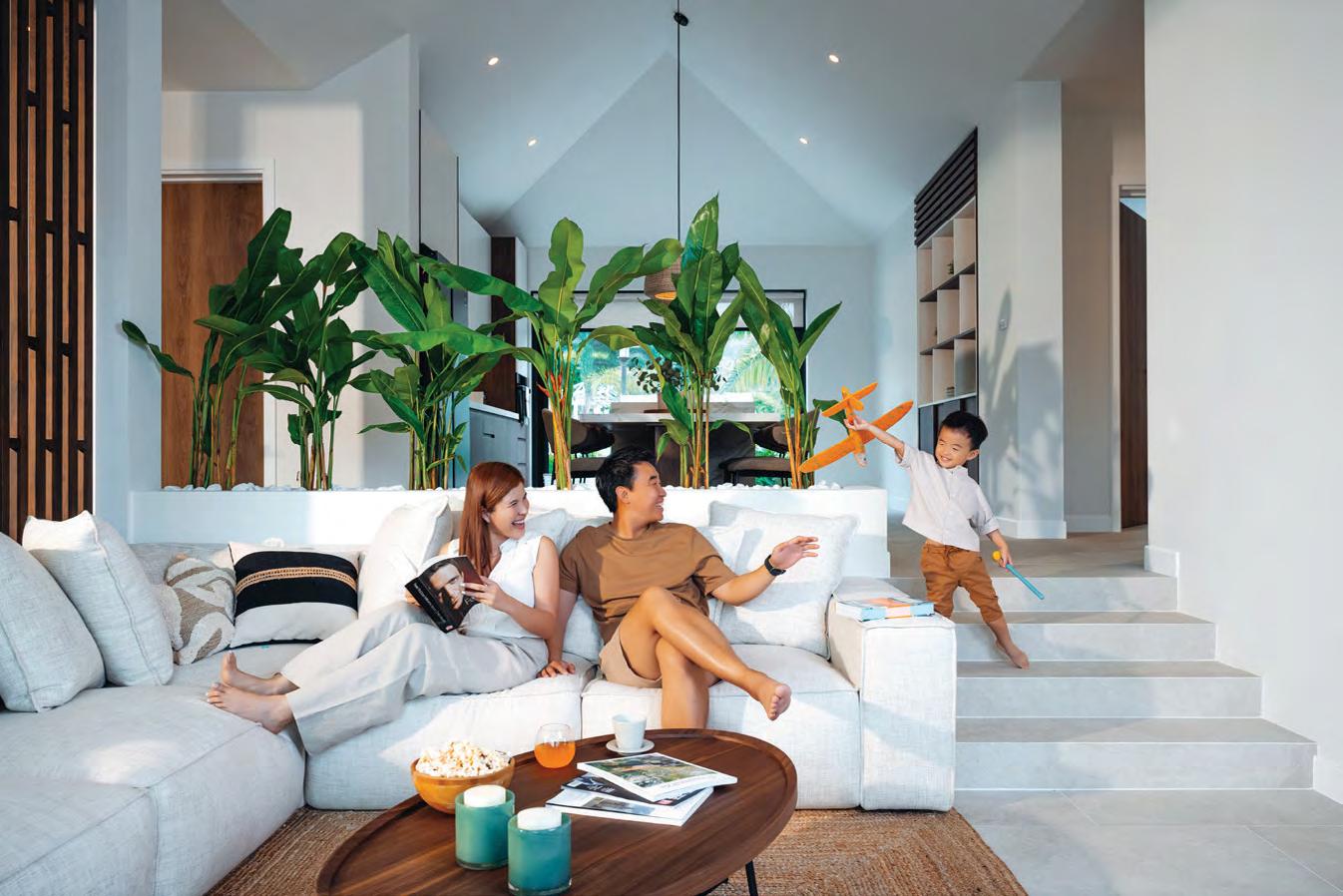Bangkok Patana
































HOSPITALITY BUSINESS SCHOOL

































HOSPITALITY BUSINESS SCHOOL
EHL's Bachelor in International Hospitality Management is not your typical business degree. Our profound passion for the industry permeates every aspect of our educational approach, and we incorporate cutting-edge teachings with hands-on training and real-world simulations to offer students a comprehensive learning experience.
Established in 1893, EHL Hospitality Business School has established itself as a pioneer in its field. Consistently recognized as the leading university for hospitality management studies and ranked among Switzerland's top five schools for management and business, our legacy of success spans over a century.


A Fond Farewell
As I sit down to reflect on my many happy years of being a teacher at Bangkok Patana School, I do so with a profound sense of gratitude and pride. Little did I know on that fateful day in the summer of 1997 when my friend and I touched down at Don Mueang Airport, that I would remain at Bangkok Patana School for the next 27 years…especially as we had only intended to embark on a two-year adventure! And what an extraordinary 27 years it has been, as it was at Patana that I met my husband and was blessed with the arrival of our two daughters, Róisín (Grad
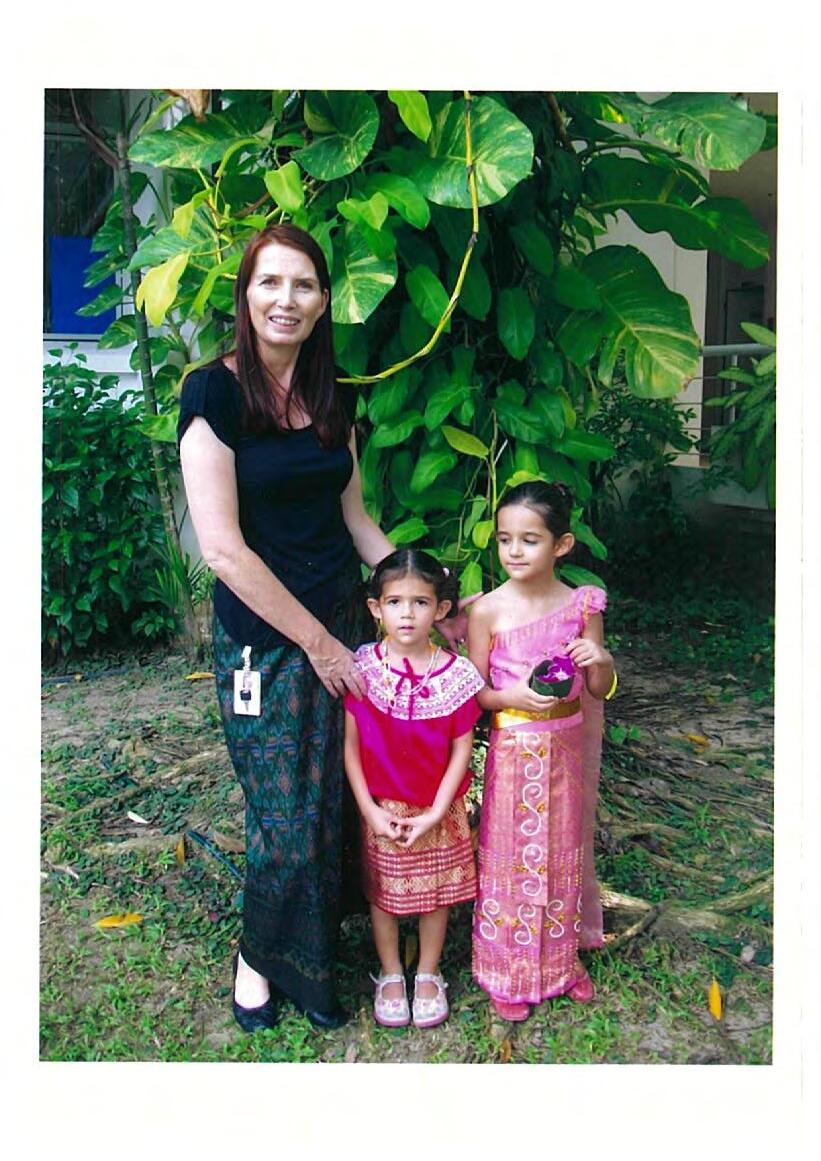
I began my career as a Key Stage 1 class teacher in the Primary School, spent a joyful decade in the Foundation Stage, followed by a few exciting years as a Learning Support teacher in Key Stage 2
before moving into my current role, which I am enjoying so much, in Secondary. I feel I have truly achieved my goal of ‘Foundation to Graduation’ as I, along with Niamh, will be leaving Patana with the Grad’24 cohort at the end of June.
When people ask me why I remained at the same school for so many years, my answer is two-fold. Firstly, I have had the privilege of working alongside some of the most dedicated and inspiring teachers, now dear friends, in the most beautiful tropical setting. The camaraderie and support of my colleagues has undoubtedly been paramount to my longevity. To each one of you colleagues, past and present, I extend my gratitude for your friendship, guidance and laughs along the way! And secondly, it has been an honor to guide and support the incredible students at Patana, whose diverse cultural backgrounds, perspectives and personalities have enriched every classroom experience. The teaching and learning experience has, without doubt, been a symbiotic exchange. I am so proud of the successful global citizens these students have become and have relished the visits and messages from students I have taught over the years.
But apart from the professional opportunities and lifelong friendships Patana has afforded me, I am forever grateful for the world class education my daughters, Róisín and Niamh, have received – both academically and holistically. They began their Patana careers as Tiny Tigers and spent their entire lives as Bangkok Patana students. As we begin to pack our boxes to embark on new adventures, we are truly overwhelmed by the magnitude of magical memories
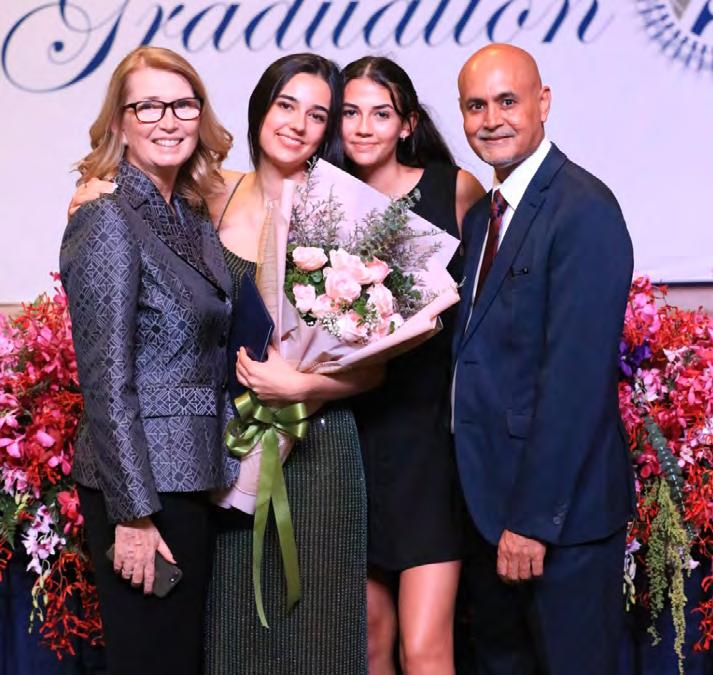
the archives are uncovering - Christmas assemblies, Records of Achievements, First of the Month books, Solo Festivals, ECAs, Residentials, Gymnastic competitions, Touch tournaments, SEASACs, BISACs, Duke of Edinburgh Gold Expeditions sailing around Koh Krabi and paddle boarding down the River Kwai, International Days, Year 2 Sleepovers, Foundation Stage Art Exhibitions, the IB Art Exhibition, Dance Extravaganzas…the experiences have been endless.
For 27 years, Thailand and Bangkok Patana School has been my second home, and it will always hold a special place in my heart. As both a teacher and a parent, I have had the privilege of witnessing firsthand the transformative power of a nurturing learning environment. I have no doubt that the Graduating Class of 2024 are fully prepared for the exciting onward journeys they are about to embark upon. I wish them every success as they, like me, flee the Patana nest.
With deepest gratitude, – Lisa Cody-Sehmar Teacher, 1997-2024
643 Lasalle Road (Sukhumvit 105)
Bangna Tai, Bangna
Bangkok 10260 Thailand
Tel: +66 (0) 2785 2200
Email: reception@patana.ac.th www.patana.ac.th
Editor: Sneha Mathew
Tel: +66 (0) 2785 2411
Email: snma@patana.ac.th
Advertisement: Finn Balslev
Tel: 081-866-2577
Email: finn@scandmedia.com
Design & Production:
Scand-Media Corp., Ltd.
Tel: +66 (0) 2943 7166-8 www.scandmedia.com
Bangkok Patana Magazine is the termly publication of Bangkok Patana School published three times per year and distributed to 2,000 members of the School community. Reproduction of articles, artwork and illustrations by written permission only. This magazine is printed on recycled paper.
• Bangkok Patana School

Is the rst Premium Outlets site located on the eastern outskirts of Bangkok at Kilometer Marker 23 of the Bangkok-Pattaya Motorway and at around 15 minutes' drive from Bangkok Suvarnabhumi International Airport.
Siam Premium Outlets Bangkok is home to a strong mix of over 300 brands including some of the most sought after luxury and designer brands alongside international and local brands. The center will provide an 'eco jungle' serving locals and tourists that will feature an impressive array of dining and leisure.

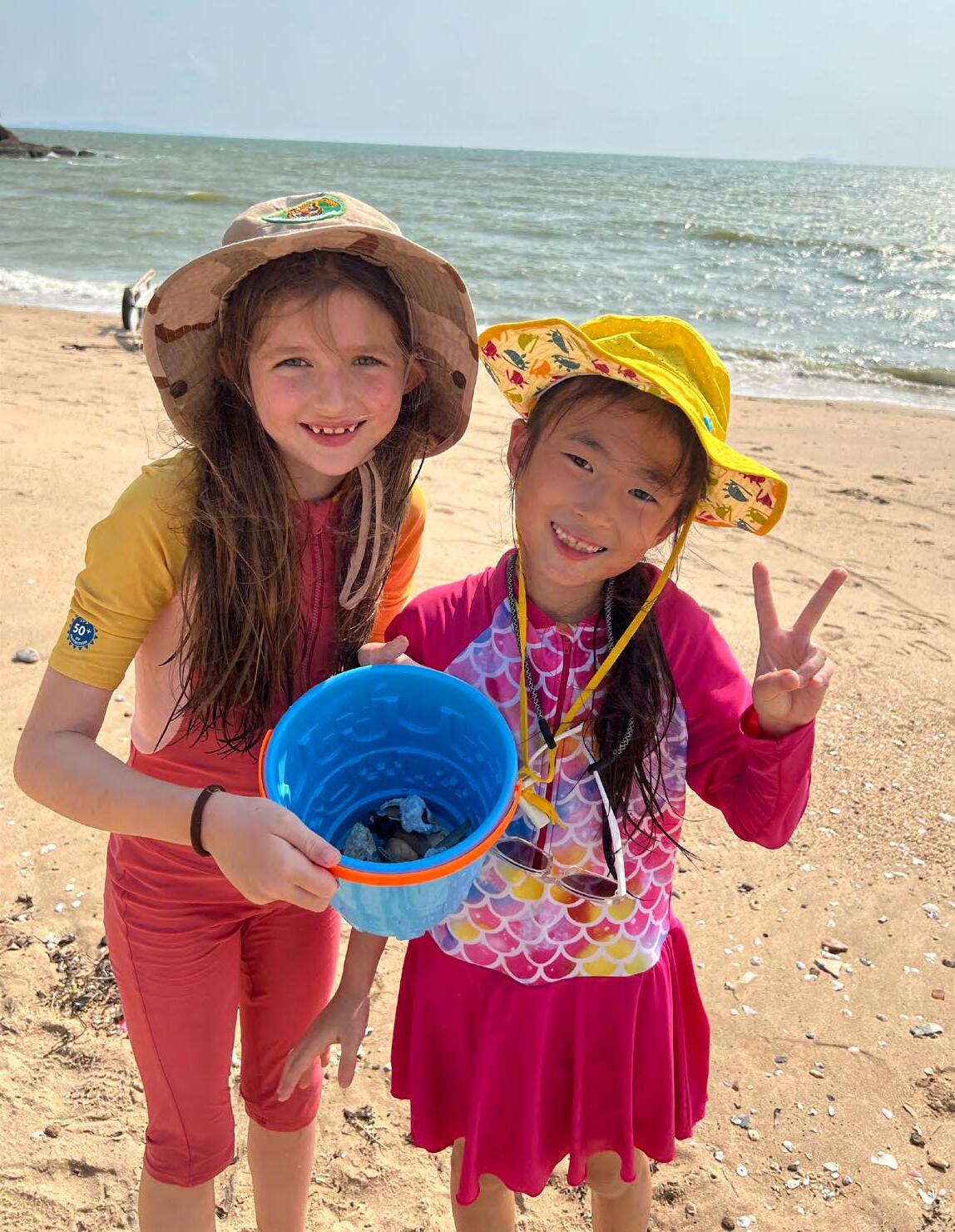
Year 3 enjoyed a fabulous Residential Visit in Pattaya at Royal Varuna Yacht Club. For some of the students, this was their first time away from home, not including the Year 2 sleepover in school. It was a chance for them to learn so much about themselves, to bond with classmates and to develop valuable life skills. “I was most proud of myself for being so independent,” said Riccardo, 3J. There were four trips in all over a two-week period, with pairs of classes on each trip staying for two nights at the resort.
A buzz of excitement and nervous energy filled the bus as we left school. “I was nervous when I went on the bus, but after a while I felt better. I was talking to my friend and it was a really long ride to get there!” said Dayton, 3J. The journey was only about two hours, and the students enjoyed chatting to their friends about all the fun they were going to have after their residential preparation in school.
“When we arrived, we had our picnic but, because it was raining, we had to eat it inside. I liked the Bon Bons the most, they were very yummy!” explained Ryan in 3L. Prior to the visits,
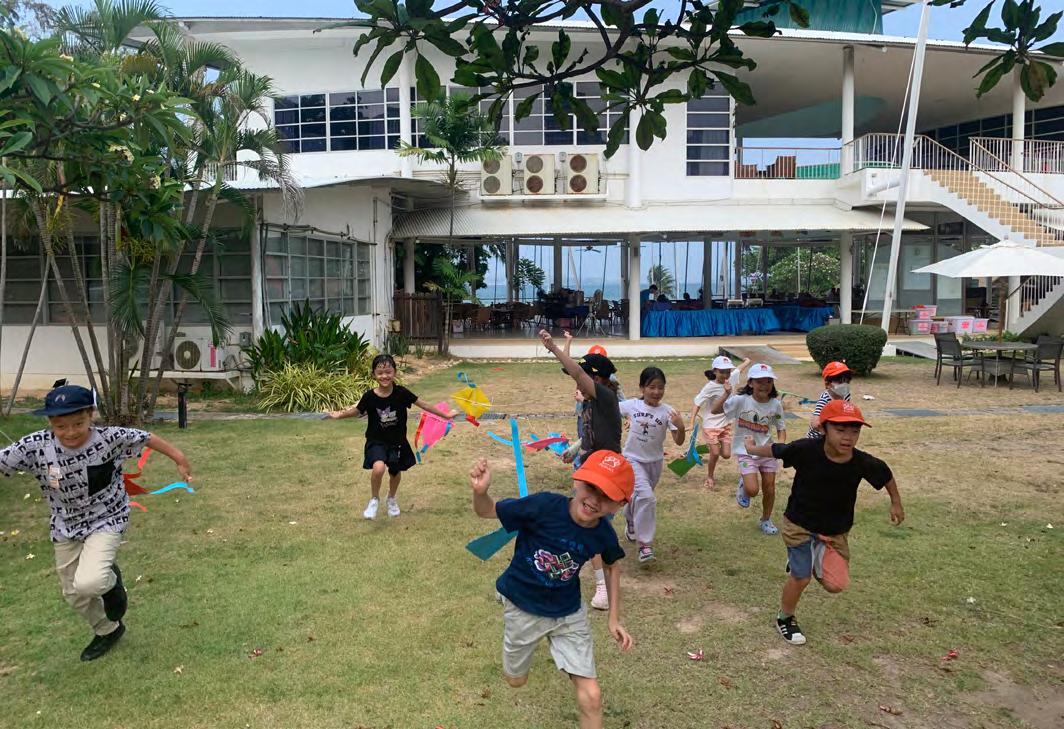
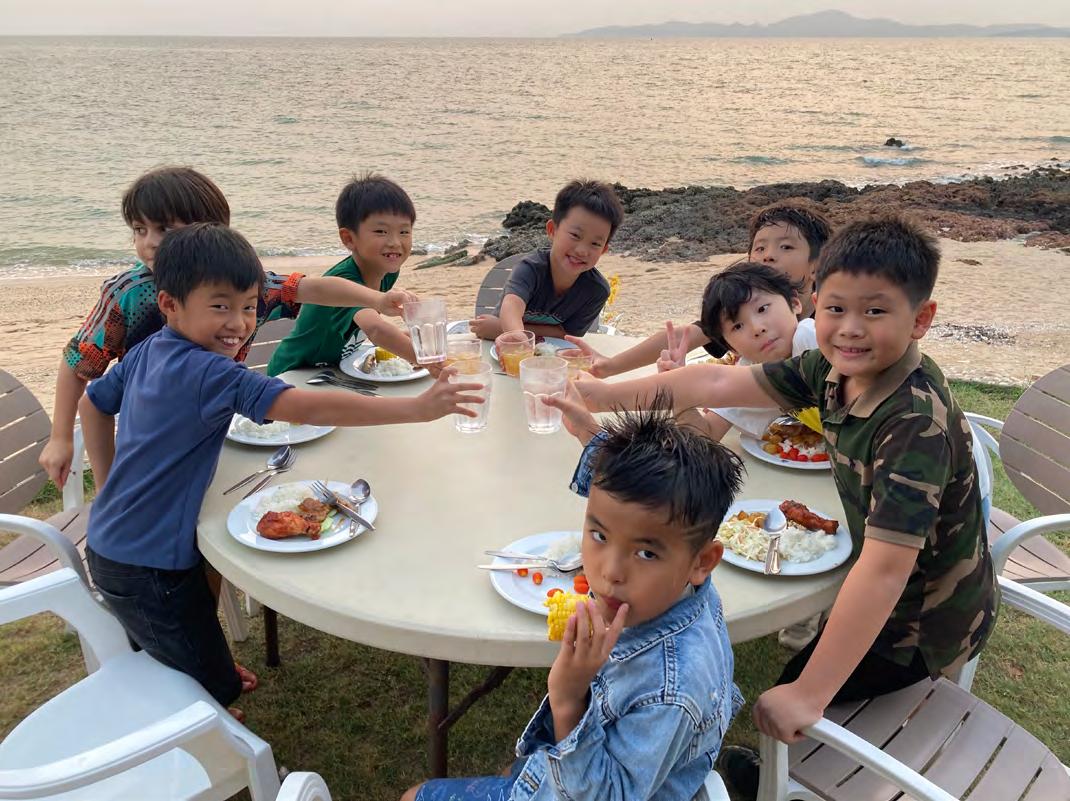
the students collaborated in groups to plan and source items for a picnic lunch. Most groups sat on mats on the grass. After they had eaten, they explored the site and then swam or did other activities around the site.
The mix of games, art, craft and music activities, interwoven with use of the pool and the beach, meant that all students were fully motivated and engaged throughout their visit. They had to be resourceful to make boats, kites and photo frames as well as problem solvers and communicators to collaborate on tasks such as moving water to fill a leaky container!
“I wish we could stay for a few more days - I loved making those pretty little photo frames,” said Iva, 3F.
When there were challenges, students showed enormous resilience to work things out and to support each other. Each group also collaborated very successfully to bury a teacher on the beach!
“I loved playing on the beach. It was lots of fun burying Ms Lauren in the sand! I played in the waves and looked for shells with my friends!” said Chloe, 3H.

Every morning began with an opportunity for students to burn off some energy and run around playing sports or games on the grass. Some of them also used the play area - the swings were particularly popular. “Then I heard the teacher blow the whistle. I ran to the breakfast area and collected my food. The food was delicious, tasty and even marvellous. I had bacon, pancakes and cereal,” said Jeremiah, 3G.
All of the food at Varuna was delicious! With plenty of choice for all, many of the students often went back for seconds or thirds! On our final night, we enjoyed a barbecue down by the sea.
“My favourite memory was the barbecue because the sausage was my favourite, and it was such a happy time,” said Sindy, 3J.
Immediately after the BBQ, the pairs of classes moved up to the function room for an absolute treat: the Talent Show! All the teachers reported back that there was a huge variety of impressive talent on show, including dancing, singing, music, magic and more. It was clearly a highlight for the students,
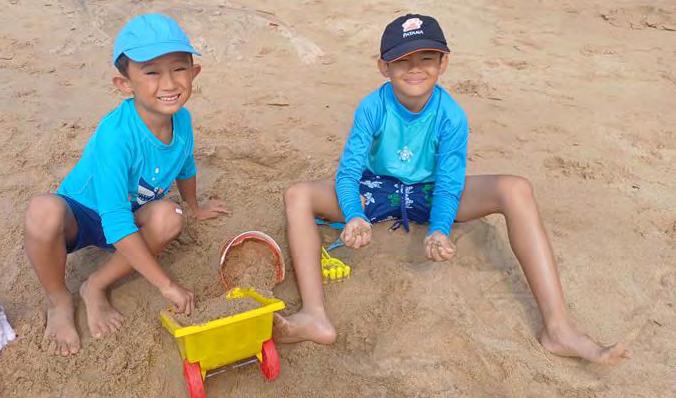
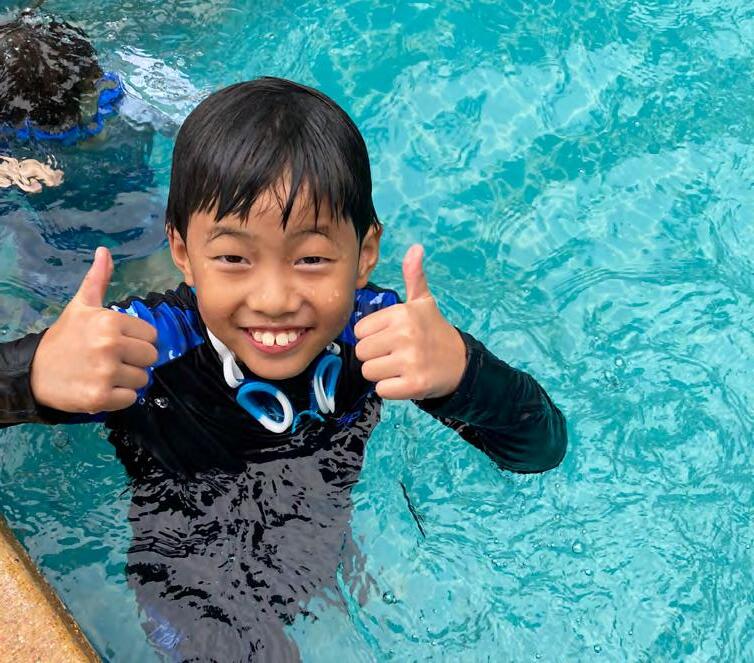

too. “Finally, it was the talent show where there were so many talents to look at like violin and singing. It came to the end where we heard the winner and it was my friend Milla. She did light dancing. It was epic!” exclaimed Naira, 3G. “It was time for the talent show. Yes! My friends and I were doing a gymnastics show which was so fun! Surprisingly, we won 1st place!” said Claudia, 3L.
By sharing rooms, students learnt to compromise and to work together. They supported one another when anyone was missing home and (mostly) succeeded in keeping their rooms tidy and well-organised! “We had another room inspection and got 30/30! We were so proud and happy with each other,” enthused Pan, 3F.
The beauty of this Residential Visit is the adaptability of the venue. Each trip was slightly different, but all were threaded with joy. “Ms Lauren took us to the bus, and I felt sad because I didn’t want to go home said Fei Fei, 3L
“We wish we could stay longer!” exclaimed Sipim and Tuang, 3D.
See you next year, Royal Varuna Yacht Club!



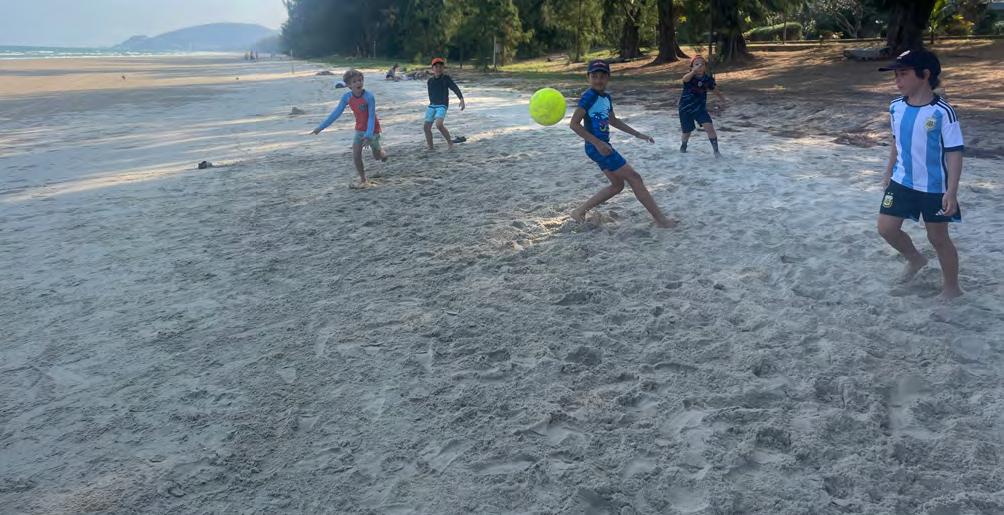

Earlier this year, Year 4 students embarked on an eagerly awaited Residential Visit to Hua Hin. This residential, which took place over four days, not only provided a break from the classroom routine but also offered numerous opportunities for our Year 4 learners to explore, interact and develop our Patana values.
As the coaches rolled out onto Lasalle on Tuesday morning, butterflies turned into excitement as snacks were opened, singing commenced and games were played by both students and teachers alike! Upon arrival, the students were acquainted with their rooms for the week.
“I loved the bus journey to Resi. We sang songs all the way and annoyed the teachers!”
Lucas, 4F
Throughout the week, the children learned to share bedrooms with their friends developing valuable life skills. Discussions and scenarios that were explored in PSHE lessons prior to the trip were put into practice. Through compromise, communication and collaborative efforts, the students maintained tidiness and organisation, taking pride in their shared space aiming to score highly on the prestigious ‘room inspections’!
“I loved spending time in my room with my friends. We played games, ate snacks and told jokes.”
Raya, 4F
“One of my favourite memories will be when we got time in our rooms with our friends on Residential.”
Matt, 4J
There was plenty of time spent at the resort, our home for the week. On the picturesque beach of Suan Son, Year 4 students enthusiastically engaged in hands-on exploration, connecting with Term 2’s topic of ‘Digging in the Dirt’ in an unexpected yet delightful way. As they combed through the sands, the children discovered and collected a treasure trove of shells, stones and other fascinating artefacts washed ashore by the lapping waves. Each find sparked curiosity and prompted the students to speculate about the stories behind these beach treasures. A popular living ‘treasure’ were the hermit crabs which brought to life the idea that discovery can be found everywhere, even beneath the surface of the sandy shores.
A Resi Haiku:
On the pretty beach, Others may see sand and sea, Me, a creature’s home.
By Evie, 4F“I loved playing on the beach. I enjoyed finding different shells, crabs and splashing in the waves.”
Aaron, 4A
Various team-building activities and games that became a regular sight upon the shores of Suan Son beach were the numerous creative sandcastles being built, competitive games of beach football, bodyboarding in the shallow waves and simply enjoying each other’s company. It was wonderful to see the students forge new and existing friendships with other students in the Year group.
“We played football loads on the beach. I liked the sea and jumping into the waves and playing football on the beach. It was great to slide on the sand when playing.”
Vegh and William, 4R
A highlight of the week was the day trip from the resort to Black Mountain Water Park where the students (and staff) were treated to a day of aquatic adventures! From numerous trips up and down slides, to lazy river rides, the water park provided a perfect blend of action in addition to calmer, shaded games and art activities.
“The lazy river was super fun because you laid back and drifted along the river. It was SO relaxing.”
Prim, 4D
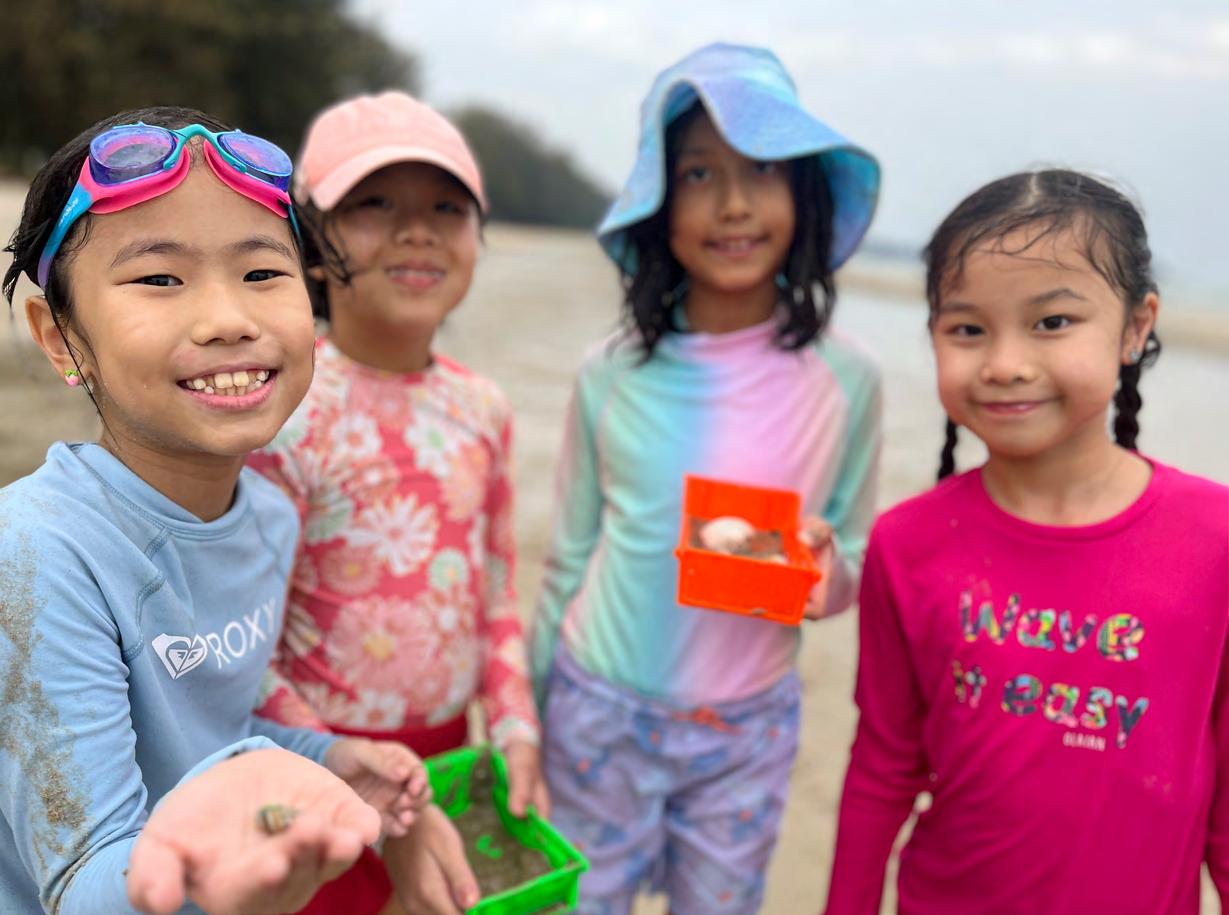


“The wave pool had really high waves and we also got to build a train with us all. We heard the bell when the waves were coming! It was great!”
Oihan, 4R
As the sun rose on our final day in Hua Hin, the Year 4 students returned home with hearts full of great memories and minds enriched with newfound experiences. The Residential Visit not only served as a memorable adventure and highlight of Year 4, but also as an experience where personal growth and learning could be nurtured.
A big thank you to the staff supporting the trip and to the student’s for making it such an enjoyable week!
To close, a final quote from Molly in 4H, who summed up the trip wonderfully!
“When I reached the hotel on the first day, I had butterflies in my tummy. What will happen? But after a day I realised that it was actually pretty fun. I enjoyed watching the talent show, but my favourite part was Black Mountain Waterpark because there was the wave pool, lazy river and the three slides; yellow slide, purple and white slide and the red slide.
I was so pleased I went to Resi, I had the best time!”
Molly, 4H
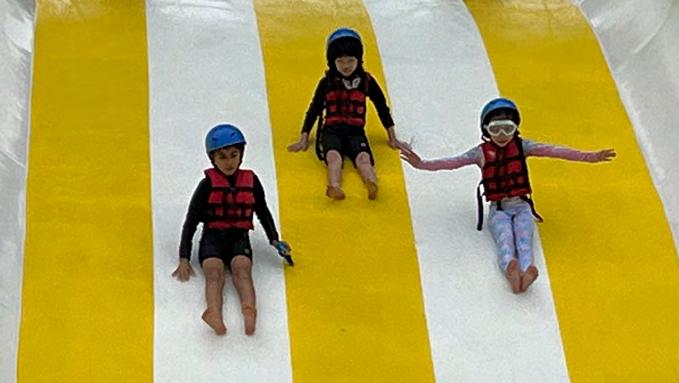
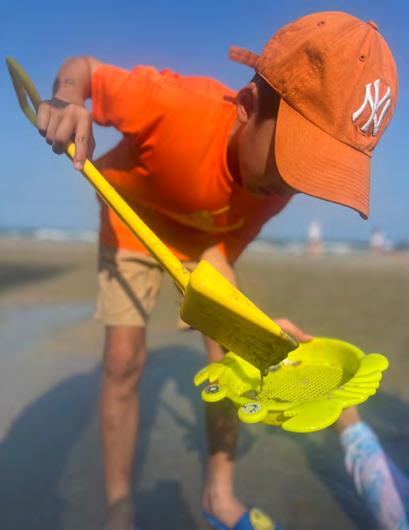



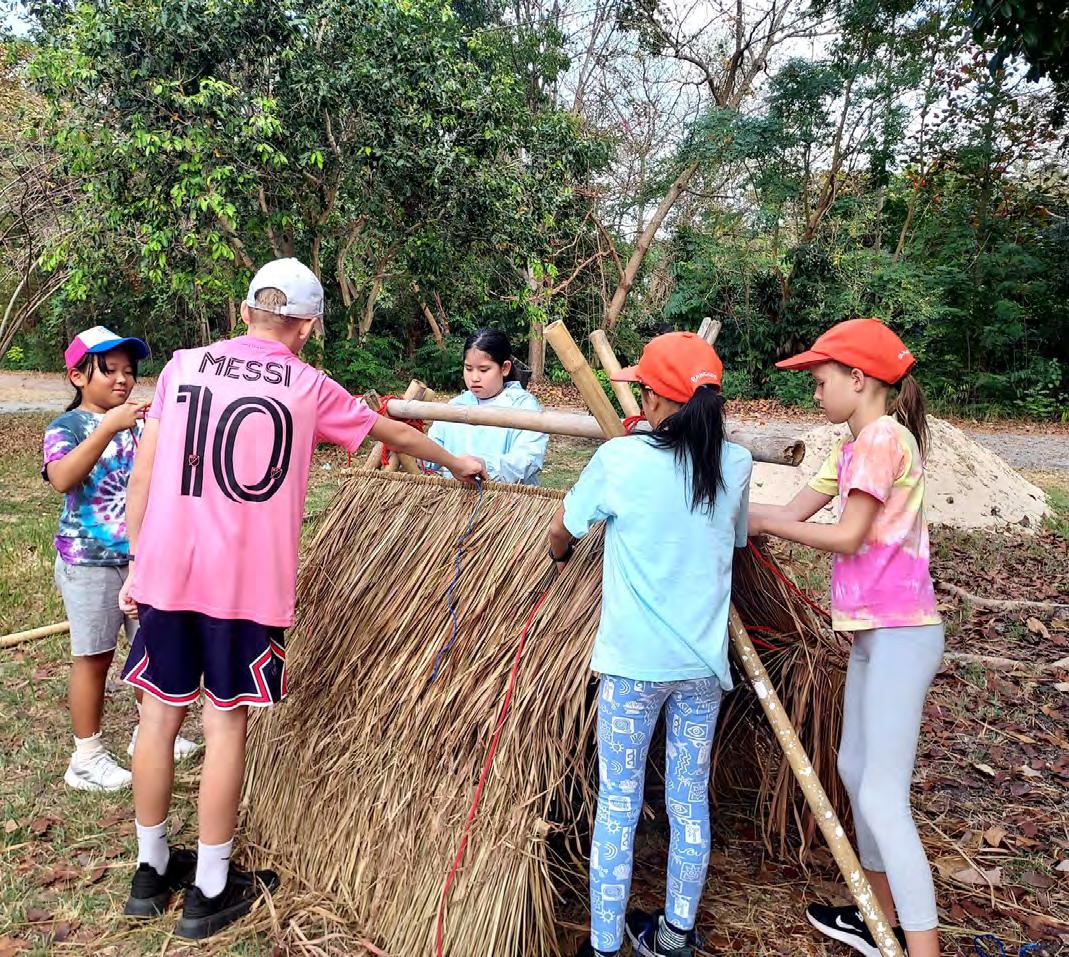
Excitement filled the air as Year 5 students bid farewell to their families, ready for their three-night adventure at Khao Yai National Park. Unpacking at the resort marked the beginning of a journey filled with both fun, curiosity, and excitement, but also collaboration, resilience and growth.
After a hearty meal at the resort, the night safari awaited. Armed with torches and anticipation for spotting the park’s range of nocturnal dwellers, we delved into the darkness: we spotted prickly porcupines, venturing deer, large bats darting overhead, and – for those of us who were watching carefully – a leopard cat! The highlight, however, was the starlit sky, unobstructed by light pollution, offering a humbling view of the stars and moon. It reminded us of the ‘emerald, green, gloomy dark’ that had been described so realistically in our Year 5 text, ‘The Explorer’:
“It was amazing seeing the constellations in the sky. I loved feeling the wind blowing in my hair, and hearing the creatures that we could not see but knew were there. I loved huddling in the trucks with my friends!”
The next day, daylight revealed the park’s true wonders. Ancient trees, over 400 years old, and claw marks from elusive Sun Bears, were fascinating to find. We marvelled at the unfolding scene of twisting liana vines, exotic flowers, vibrant butterflies, and layers of huge, leathery banana leaves shielding us from the sun’s rays. Equipped with geographical language from our classroom learning, we felt like true explorers navigating the rainforest’s sights and sounds! While finding
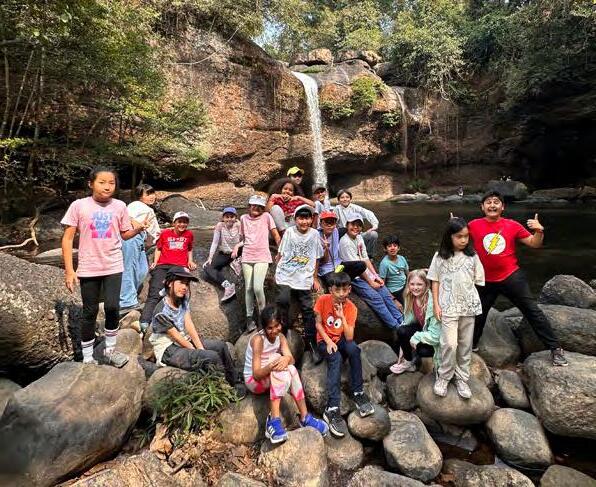
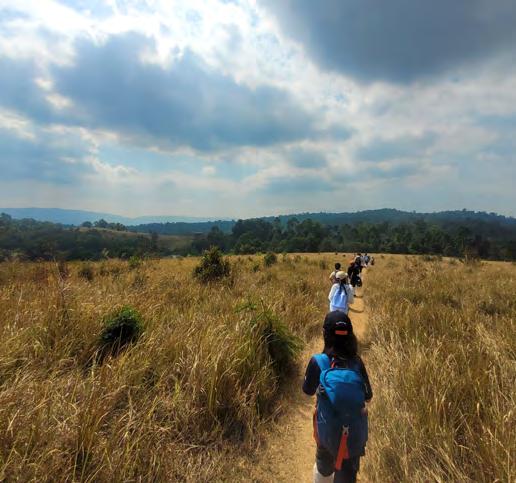
our way through the forest, one group was fortunate enough to spot a nesting hornbill in the emergent layer – incredible! A challenging trek led us to a breathtaking waterfall, providing a refreshing break from the rainforest’s humid environment. The children encouraged one another across the rocks to enjoy a closer view, while many took a seat to take in the peaceful scene and enjoy a moment’s rest.
“I felt like I overcame a small fear at the waterfall, which was climbing across the rocks, something that made me feel quite nervous. With the support of my friends, and encouragement from everyone, I triumphantly made my way closer to the waterfall. I was so happy I had challenged myself!”
Inspired by our shared reading of ‘The Explorer’ in class, our trip took a thrilling twist with the Howling Gibbons adventure program, which involved building shelters, rafts and fire making, just like the characters in our class book. We put our survival, communication and problem-solving skills to the test while constructing shelters that had to endure the elements (in the form of a sudden ‘rain’ shower). Unfortunately, we found that some of our shelters did not provide as safe a refuge as we had hoped. We also mastered the art of fire building using a flint and steel. Our success was measured by whether we could manage to toast marshmallows by the end…we weren’t quite confident enough in our abilities to light a fire without any
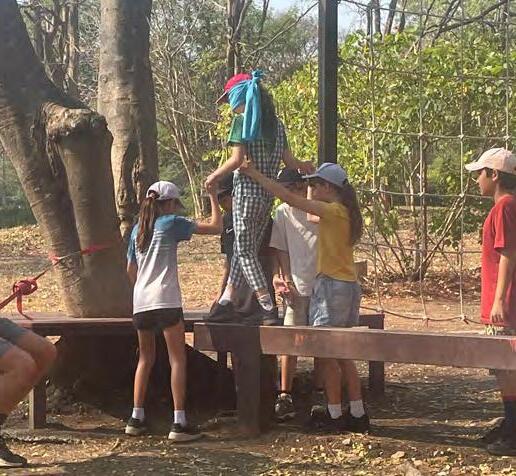
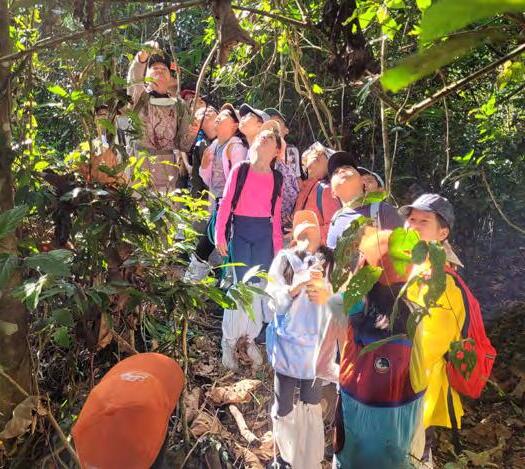
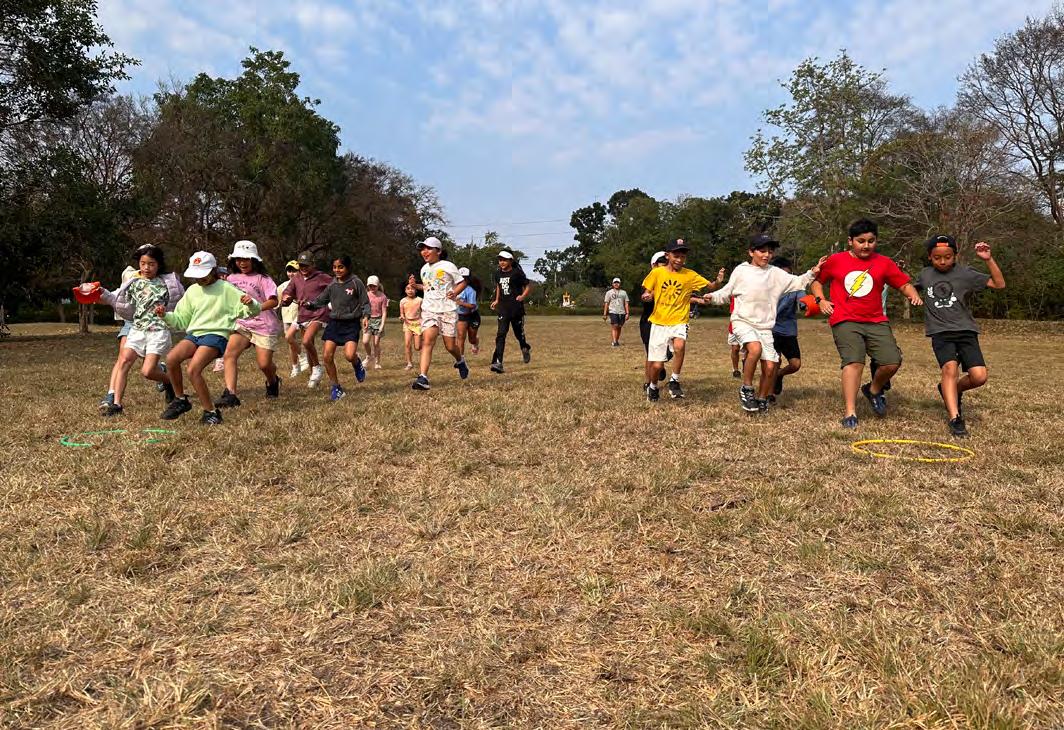
equipment and, fortunately, we weren’t completely in the wild! We left Howling Gibbons feeling a great sense of satisfaction and pride in our newfound skills.
“It was such good fun making a raft with my friends. What was most hilarious was when we set off from the poolside feeling full of confidence that we would make it to the other side, only for the raft to slowly come apart and drop us into the water below. Hopefully, we’d be much better skilled at building one if we were really stuck in the jungle!”
For the duration of the Residential, we had the opportunity to participate in many team building activities and games. We learnt about the importance of working together and realising what we can achieve as a team: whether that was while building a raft that may or may not float; or working together to maintain tidy and hygienic spaces in our rooms ready for room inspections; or perhaps communicating effectively and listening attentively to others’ ideas during our Quiz night games. We encouraged and challenged one another to dive deeper to overcome difficulties, bringing a smile to each other’s faces when faced with an obstacle, and celebrating our achievements together! Throughout the warm, sunny afternoons, we relaxed by pursuing various activities at the resort, such as swimming, board games, cycling, and ball games. This all helped to foster new friendships and create lasting memories.

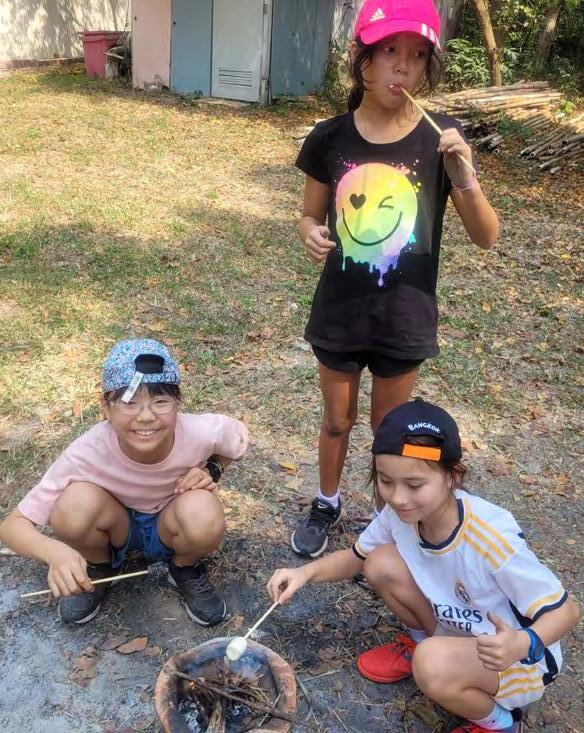
“I had never learnt to ride a bike before. I asked my teacher if I could learn from my friends and practise during the residential one afternoon. Amazingly, I left the residential having learnt how to ride and with the confidence to ride all by myself! I was so proud, and happy that my teacher and friends had believed in me.”
Amidst adventure and learning, moments of fun and camaraderie included quiz night, a barbecue and the talent show, which proved a wonderful exhibition of interesting and amazing skills and interests: from beautiful singing to bubble skills, ukulele performances, rapping, jokes, tug of war, and role play! We shared it all! Laughter and joy brought our Year group closer and created memories that we will all – teachers and students - cherish forever.
Throughout the trip, we observed our students’ unwavering tenacity, motivation, and collaborative skills. Their openness to novel experiences, their evident growth and resilience in the face of challenges, as well as their inventive problem-solving skills, were notable and wonderfully rewarding features of the trip. Undoubtedly, these qualities will ready them for their future endeavours.
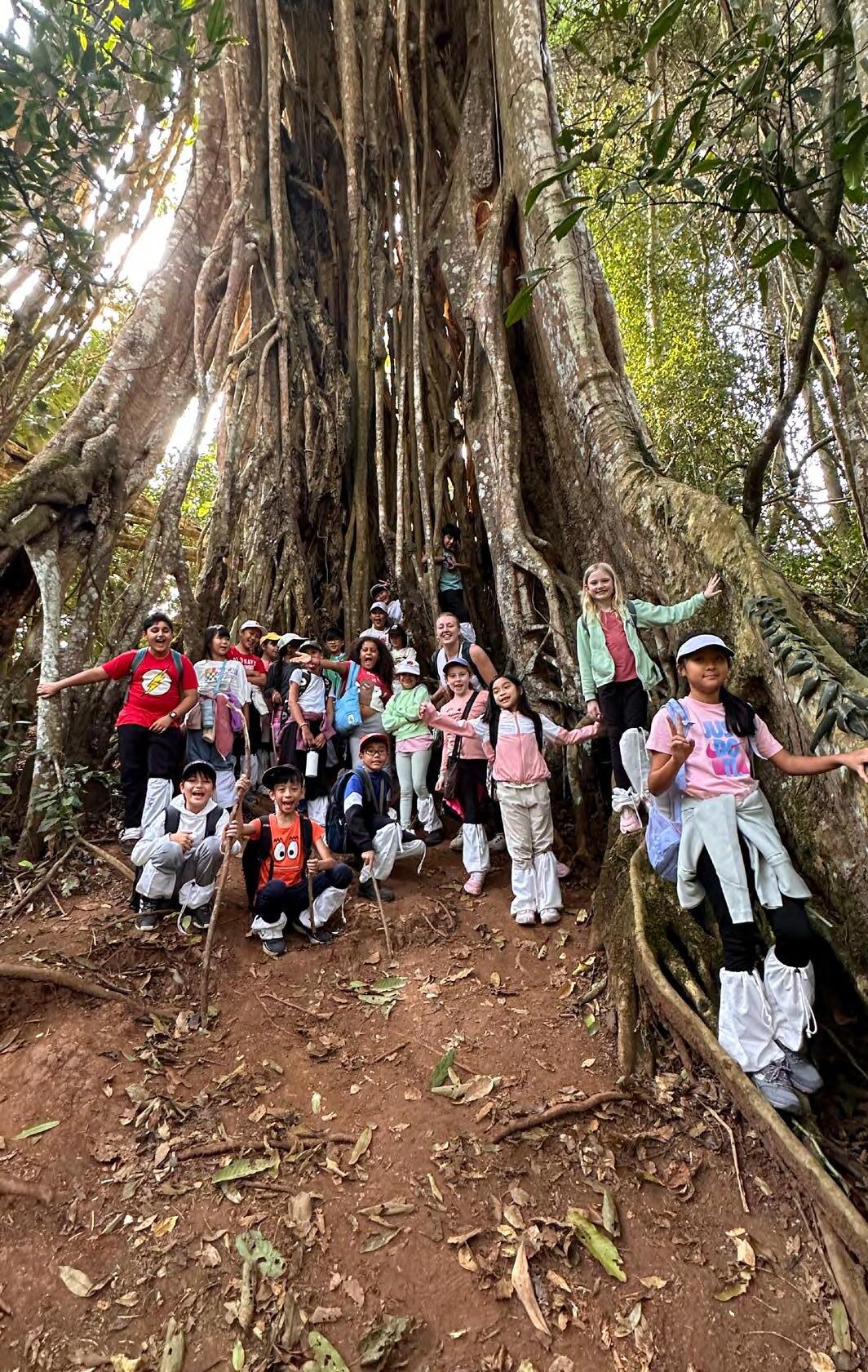
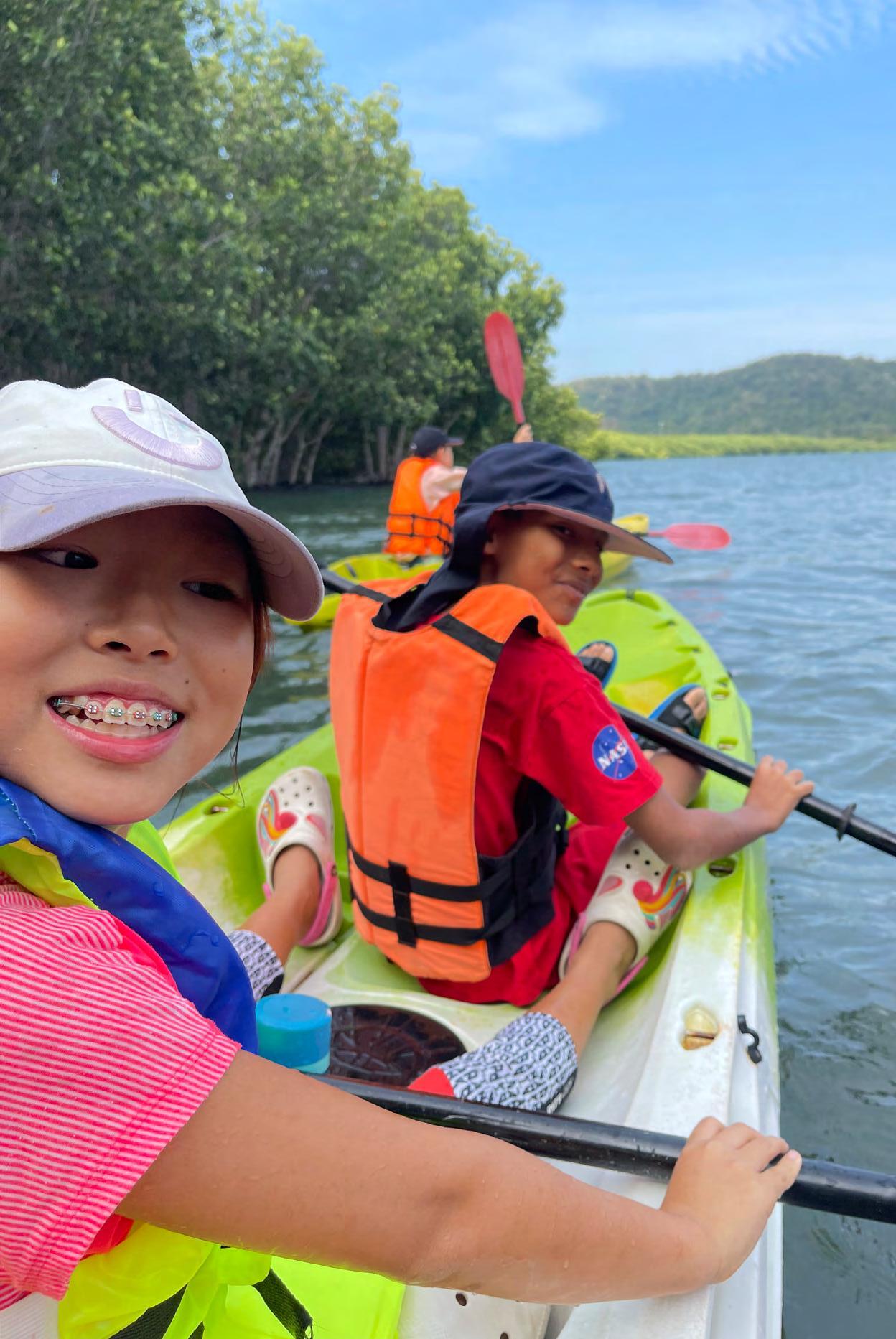
Filled with anticipation and excitement, Year 6 embarked on their residential, creating an electric atmosphere. En route to their final Primary School Residential in the southern province of Chanthaburi, the buses echoed with lively chatter among the students.
Upon arrival, collaboration skills were activated as students played The Holey Pipe Game, where students worked together to fill a pipe with water despite its numerous holes. Laughter and splashes filled the air, leaving the classes a bit soggy but thoroughly entertained.
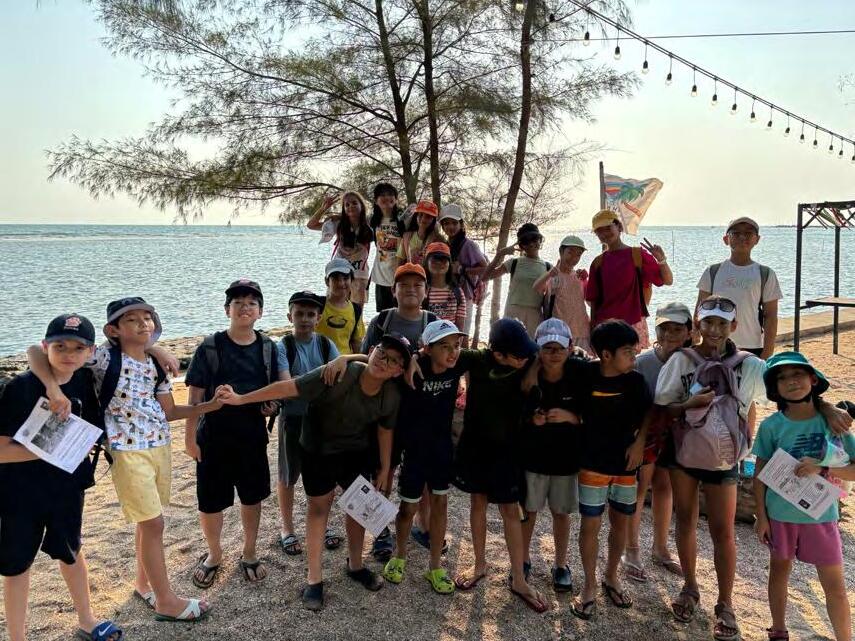
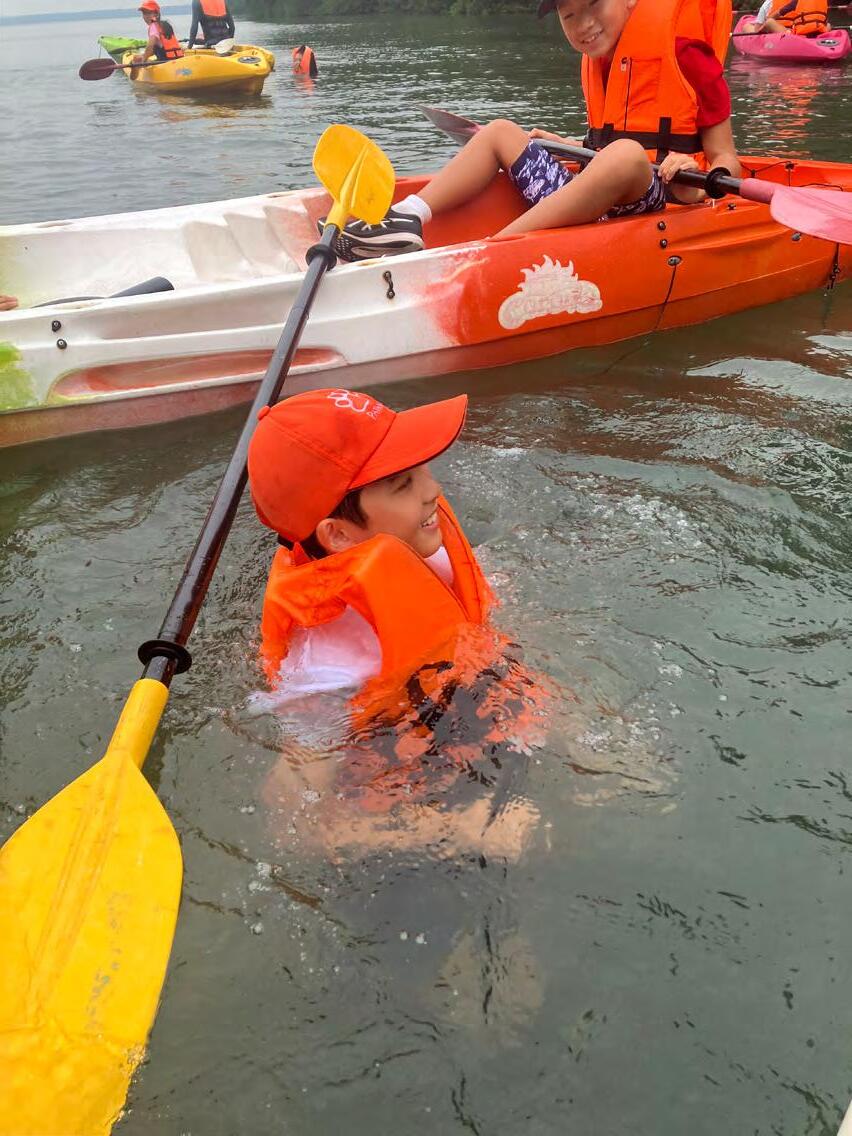
A highlight of the trip was a visit to Khao Kitchikut National Park, involving a short forest hike leading to a refreshing waterfall and a natural pool. Giggles and laughter resonated as students cooled off and engaged with the resident fish in the forest pool.
An unforgettable experience awaited the students during their camping adventure. Beneath the stars, surrounded by the sounds of birds, geckos, and occasional frogs, they fell asleep, a wonderful encounter with the creatures of the forest coming to life after dark.

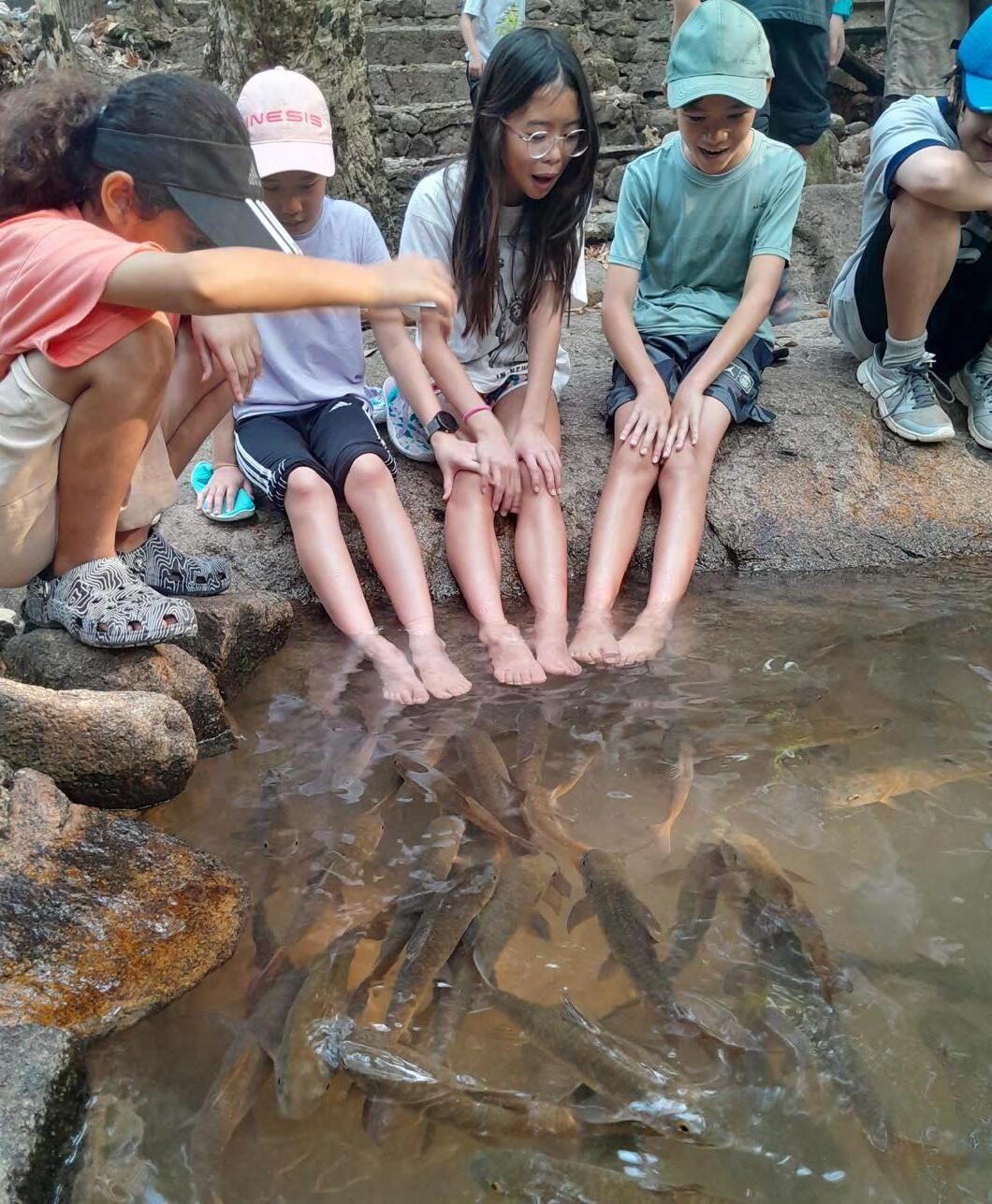
Immersed in nature, the Year 6 students explored the mangrove forest, gaining firsthand knowledge of wildlife in its natural habitat. Amidst the protective mangrove trees, students encountered kingfishers, fiddler crabs, mudskippers, and even snakes. Kayaking through the meandering waterways of Khung Kraben Bay allowed them to appreciate the stunning beauty of the mangroves from a unique perspective.
As the journey concluded, a mix of enjoyment and reflection filled the air. Students fondly reminisced about campfires, encounters with animals, indulging in ice creams, preparing meals together, and creating cherished memories with friends on the beach and in the forest. Exhausted but content, Year 6 drifted off into a well-deserved sleep at the end of their final Primary Residential.
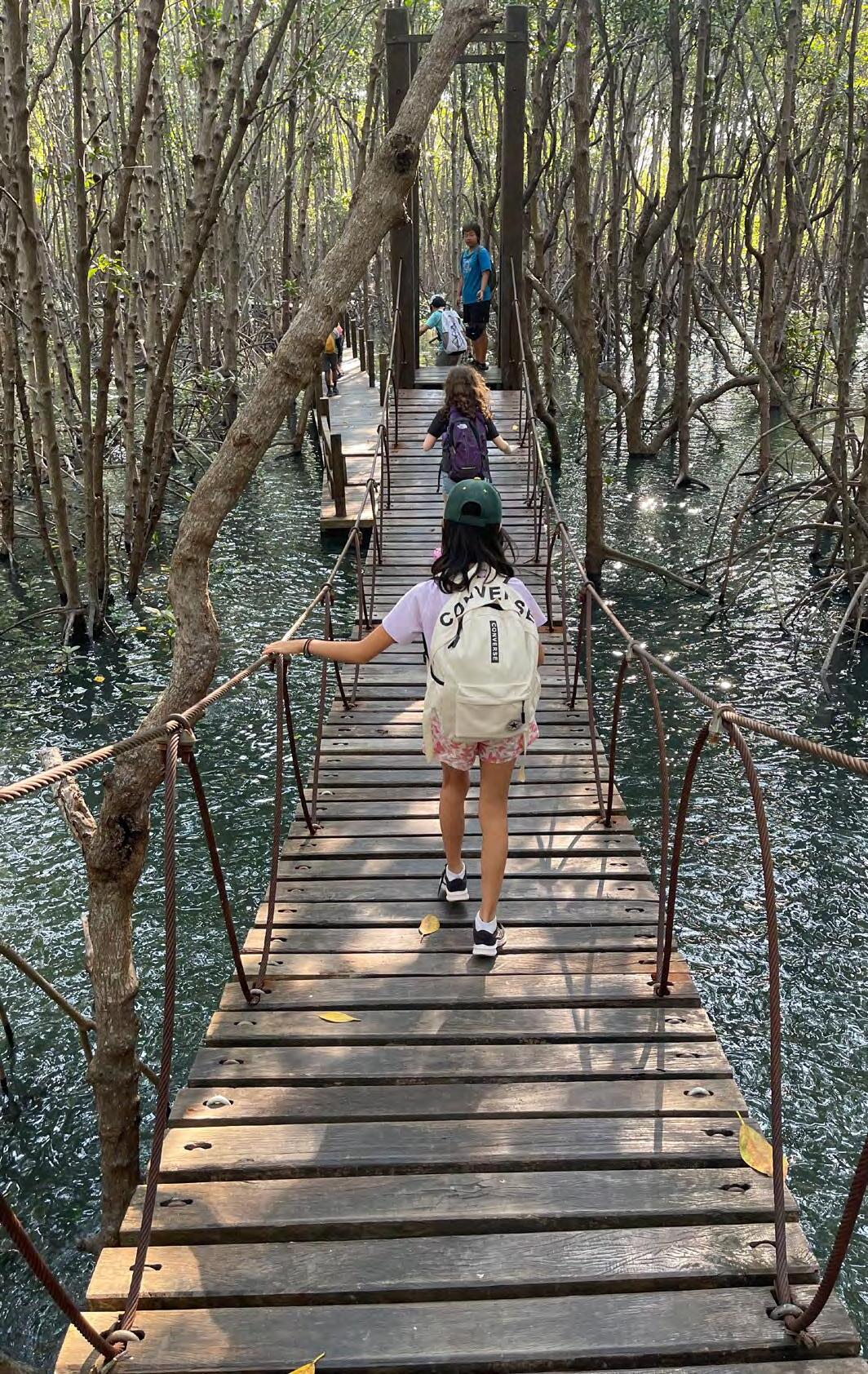
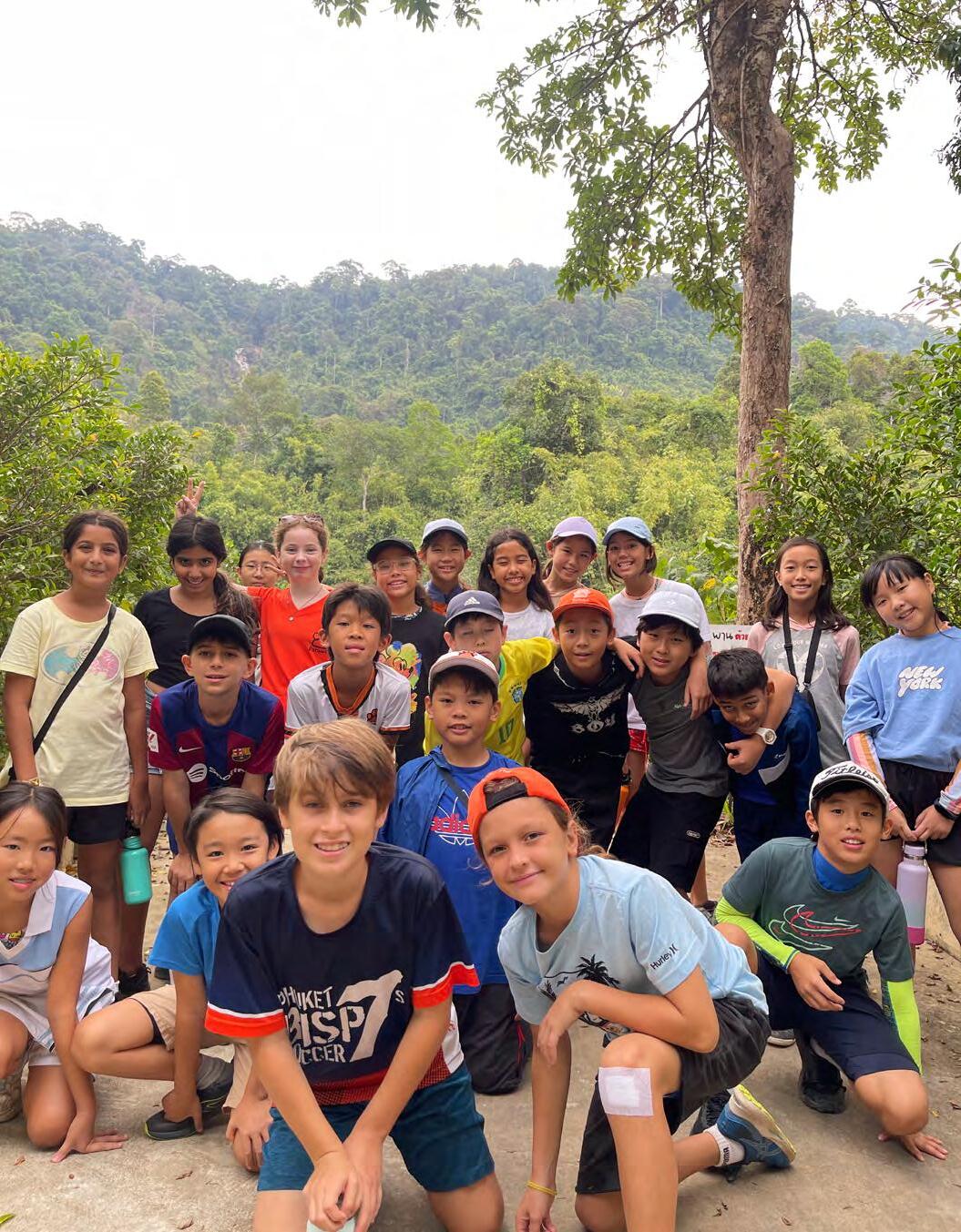
Bangkok Patana School is honoured to celebrate the dedication of the employees listed below, who have served fifteen years and more at the school. To put this into perspective: Our thirty-five year employee started around the time when School was gearing up to move to a new location from Soi Navin to its current location in Soi Lasalle; our thirty year employees started in the year when the Transport Department was established, bringing the service in-house, giving the school ability to control the cost and quality of service; our twenty-five year employees began

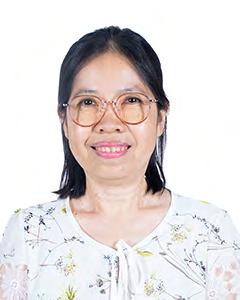



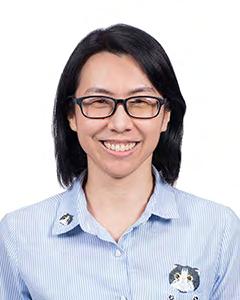
the year that School celebrated it’s first Tiger Spirit Day; our twenty-year employees the year that the the Gymnastics Club was founded, paving the way for the current Gymnastics Academy; our fifteen-year employees around the time when School went wireless with the integration of Wi-Fi on campus and also the same year when School became the custodian of its own licenses, first held by DTEC and later transferred to the Ministry of Foreign Affairs. When you see them, be sure to ask them to recount some of their most interesting and fondest memories of the school.

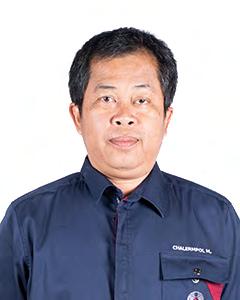

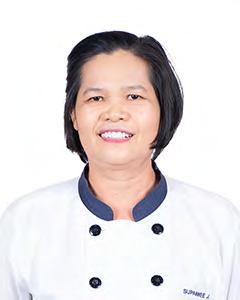

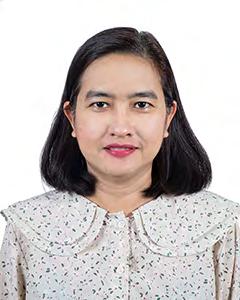



Mr Mai Niyom 15 Years
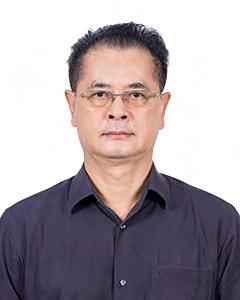
Mr Wichit
15 Years

15 Years


20
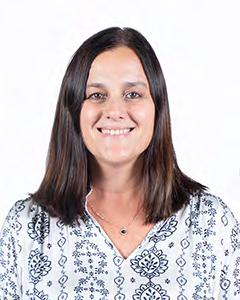
Mrs Mariela Bianciotti-Sennecke 15 Years

Mr Somchok Ongsakul 15 Years

Mrs Catherine
15 Years
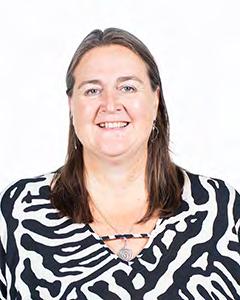
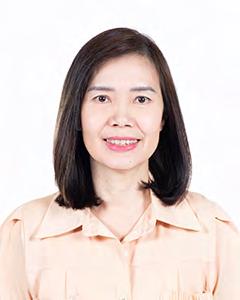

15 Years
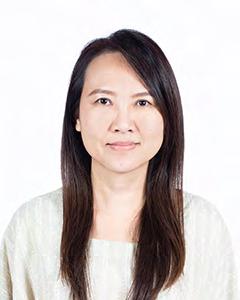
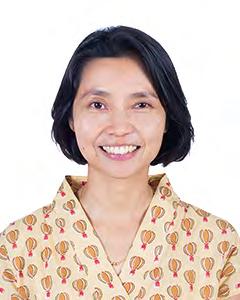
15 Years
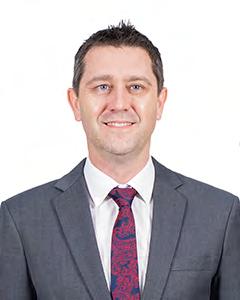
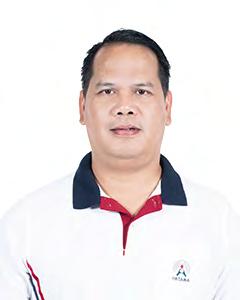
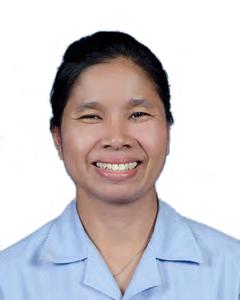
15 Years

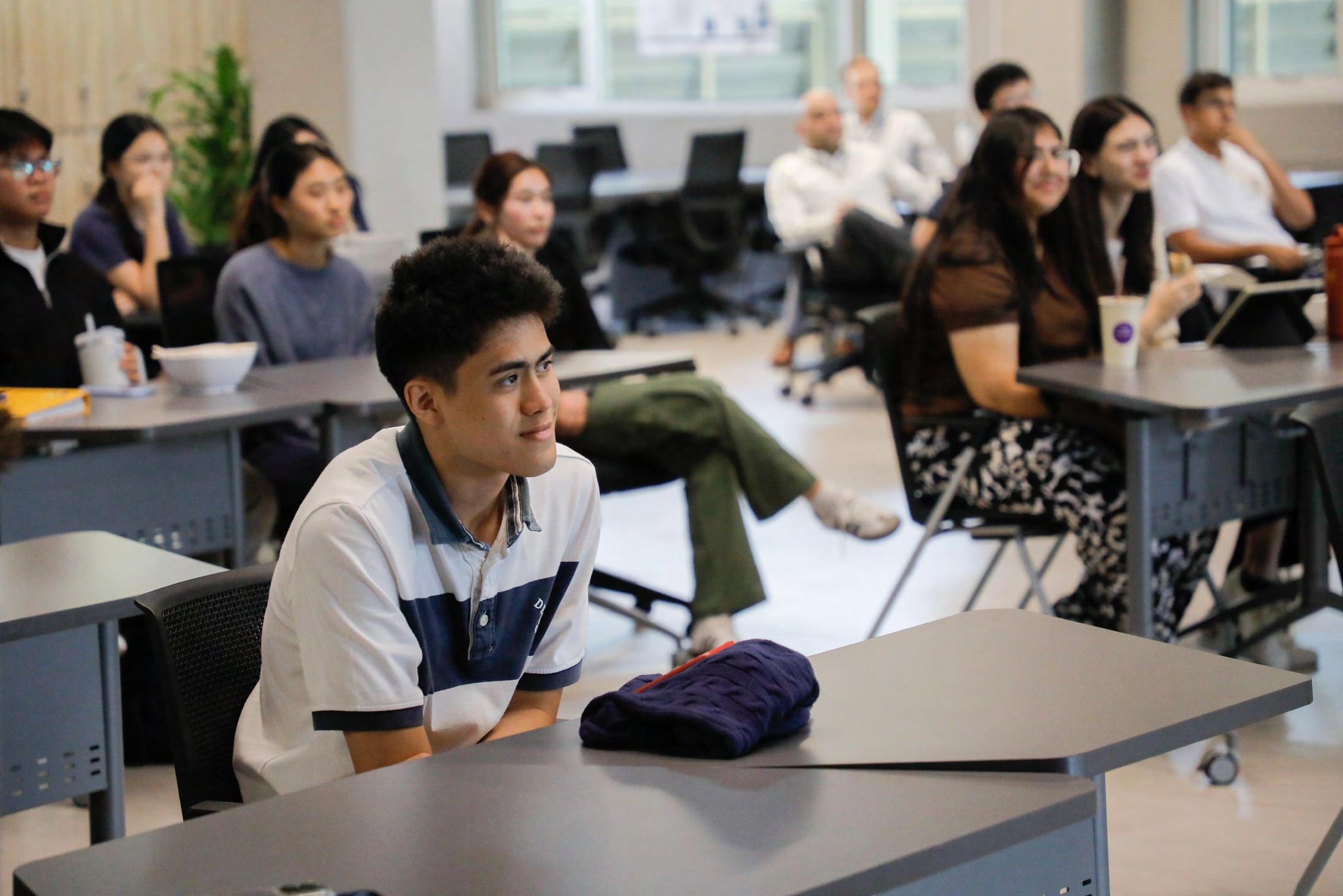
It is with great pride that I write to you to celebrate innovation and expansion to our curriculum through the introduction of the International Baccalaureate Career-related Programme (IBCP) with an art specialism, starting August 2024. This exciting course stands as a complementary programme to our well-established International Baccalaureate Diploma Programme (IBDP), offering a tailored, rigorous education geared towards students with specific career aspirations in art and design.
In the first of two insightful articles about the IBCP in this issue, Andrew Roff, our IB Coordinator, recounts the meticulous journey that our staff have undertaken towards authorisation to deliver the IBCP at our school. His piece, titled “IB Careerrelated Programme; a voyage of investigation, preparation and action,” details the strategic planning and community engagement that underscore our commitment to providing a diverse and specialised curriculum for our students.
Following Andrew’s article, Kevin Keller, Head of our Careers and University Counselling faculty, explores the IBCP’s impact on future career and university prospects. His article highlights how the IBCP not only meets the unique needs and ambitions of our students but also enhances their preparation for higher education and beyond, particularly through the Personal and Professional Skills course which is integral to the programme.
As we move into this next phase of Bangkok Patana’s development, we are excited about the potential for expanding our IBCP to include additional specialisms whilst cultivating highquality partnerships that will enrich our programmes. Our vision is to enhance our offerings, to provide even more options that are capable of equipping our students for the challenges of the 21st century. I warmly invite our community to join us, and learn more about this programme, which will enhance the vibrant, innovative learning environment at Bangkok Patana School.
Bangkok Patana School has a long and proud association with the International Baccalaureate Organisation (IBO). Since 1994 we have had at the backbone of our Senior Studies curriculum the IB Diploma Programme. This wonderful programme of study prizes the IBO’s aim to develop internationally minded people who, recognizing their common humanity and shared guardianship of the planet, help to create a better and more peaceful world. It is a broad, balanced and rigorous course of study which prepares students brilliantly for the world of further education. But we recognise that for students who wish to commit to an area of specialism, this may not be the best curriculum fit...
At the beginning of academic year 2022/23 we identified a priority to research into curriculum provision for our students who are passionate about a particular element of their study, and ready to commit to it in a post 16 ‘deep-dive’ as opposed to the broader offering of the IB Diploma. We were conscious of the needs of our community and the commitment that we make to our families when they charge us with the responsibility of providing an appropriately challenging educational pathway for their children until they graduate at age 18. It is of course our priority to make sure we prepare all our children for the huge, and ever increasing, number of opportunities that await them.
The initial stages of our research led us to investigate a variety of programme offerings, through visits and consultation with colleague schools in Thailand and beyond. The International BTEC, which is offered in a number of different subject areas (Art & Design; Business; Sport; Hospitality amongst others), impressed us as having great merit. It is a modular programme of study, which allows students to engage in practically focused extended project work in their chosen specialism. It is a programme, which is well established in the United Kingdom and recognised by universities around the world. Additionally, a number of our teachers are well acquainted with and experienced at teaching

it. We were also very impressed with the IB’s Career-related Programme, which is an exciting development of the IB’s suite, aimed at 16- to 19-year-old students, which allows them to focus on a particular curriculum element whilst also embracing the ethos of the IB, which is so reflective of our own guiding statements.
Further research and discussion with an active regional network of educators, and continued consultation within our own community led us to the conclusion that combining these two qualifications would be an excellent fit for Bangkok Patana. The IB Career-related programme provides the overall structure for an exciting programme of study, built around the IBTEC as the Career-Related Study (CRS), and complemented with two IB Diploma Courses, and a core composed of four elements which act to glue the programme together; promoting student agency and well-being through exploration of diverse perspectives on real world issues and practical engagement with them.

Having identified the IBCP as the right programme for our community, we entered the preparation phase, to ensure our Career-related Programme would be ‘Patana Quality’, and ready for first teaching in August 2024. For this we needed authorisation from the IBO, teachers ready to teach the different elements, and most importantly, students ready and excited to study it.
In June 2023, we engaged in a consultation meeting with students and parents from our Grad’26 and Grad’27 cohorts, which confirmed that there was certainly excitement and appetite for this proposed offering. Of the different IBTEC courses, the greatest initial interest was in Art and Design – and so this was identified as the first specialism that we planned to offer.
Having investigated and identified the IBCP, we then moved into the preparation phase by declaring our candidacy for authorisation to run the IBCP with the IBO and applying for authorisation to teach the IBTEC. This journey began in September 2023, whilst we continued to engage with our students (and families) in current Year 11, to ensure we went on the learning journey together. Our fantastic Art faculty, along with representatives from leadership undertook IBTEC training and certification followed quickly after.
Moving from candidacy to authorisation with the IBO was a longer-term project, which required us to undertake consultancy and verification visits that brought visiting educators to check our alignment with the IB’s rigorous standards and practices at each stage. As an established and high achieving IB World School, we are already well aligned with these principles through our Diploma Programme (evidenced in an excellent programme evaluation in early 2023) and have been able to carry them across to our Career-related Programme. The IB have recognised this, giving us commendations in each of the stages of our authorisation, and providing us final approval on 18th March 2024.
The preparation phase of our journey now continues, as we complete readiness for first teaching in August 2024. Detailed lesson planning is underway, as is professional development and community outreach so we can make this exciting new offering truly world class. As we move from the preparation to action phase of our IBCP implementation we are keen for collaboration with expertise from within our wider community and are keen to hear from anyone who works within the Arts that may be able to offer our first cohort of student’s perspectives and experiences beyond the classroom.
Our process of development of the IBCP has followed well-articulated stages. This reflects a process that we are very intentionally using with our student led Community Engagement teams in the Secondary School. As with all of our academic offerings at Bangkok Patana School we will continue to critically reflect on our IB Career-related Programme and use this to learn from our experiences as well as maintaining dialogue with an active network of schools across Asia who are all engaged in and at different stages of implementation. It is in this way that we can continue to sustain and grow the IBCP as part of our Senior Studies Curriculum.
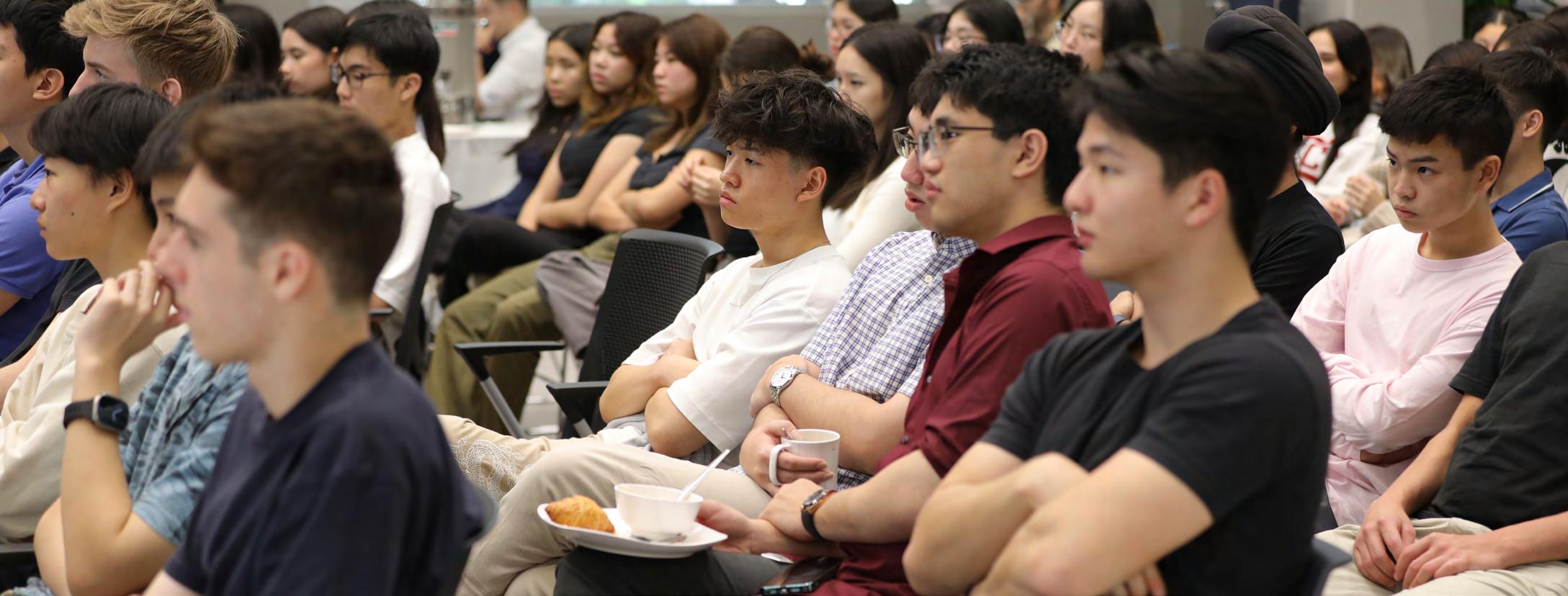
In the world of post-secondary education and career planning, ‘fit’ reigns supreme as the factor most crucial for student success at university and beyond. Fit is a buzzword used by university counsellors like us around the world to encourage students and their families to consider a plethora of factors when choosing their post-graduate pathways. The introduction of the International Baccalaureate Career-related Programme (IBCP) at Bangkok Patana can start students out on a path to university fit in a whole new way.
The IBCP stands as a complementary pathway to the wellestablished International Baccalaureate Diploma Programme (IBDP), designed to cater to diverse learner profiles. Recognising that each student’s educational journey is unique, the IBCP offers a programme that is rigorous, tailored to students who seek a more specialised, and applied learning experience alongside academic studies. It is a programme that allows students to pursue excellence in a manner that aligns with their personal and professional aspirations, without compromising on the quality or integrity of their educational experience.
The Art specialism which will be initially offered at Bangkok Patana through the IBCP will provide students with well-developed perspectives, approaches and a robust art portfolio that stands out in university entry to art-related programs. The additional time in the studio which the IBCP allows students, will give them valuable time to work on their application components and receive feedback from counsellors and teachers on portfolios.
The IBCP is gaining momentum as a qualification for university entry for students with focussed subject specialism, particularly in destinations favoured by Patana students, such as the United Kingdom and the United States. The IB’s university recognition team is committed to advocating for the IBCP, ensuring it continues to open doors for our students worldwide. Our Careers and Universities Counselling team is dedicated to giving each IBCP student bespoke career advice based on their intended country destination and type of university. Fit is important to achieve for all of our IB students, and we will work in tandem with each student and their family to ensure that their aspirations can be met after they graduate from Bangkok.
Preparing students for their transition to university is a major part of our work as university counselors and another huge benefit of the IBCP is the ‘Personal and Professional Skills’ (PPS) Course. The PPS will allow even more time for preparing students for academic and social life beyond Bangkok Patana in the independent environments which they are about to encounter. We’ll cover things from academic integrity to practical skills for ‘adulting’ to examining perspective based on cultural surroundings.
We are very proud to be offering the IBCP as a complementary programme for our community. For students whose aspirations and interests align with what the IBCP offers, this programme can provide the confidence to achieve academically, the time to focus on their specialism, and the tools to succeed personally, while setting themselves up on a pathway directly to university.
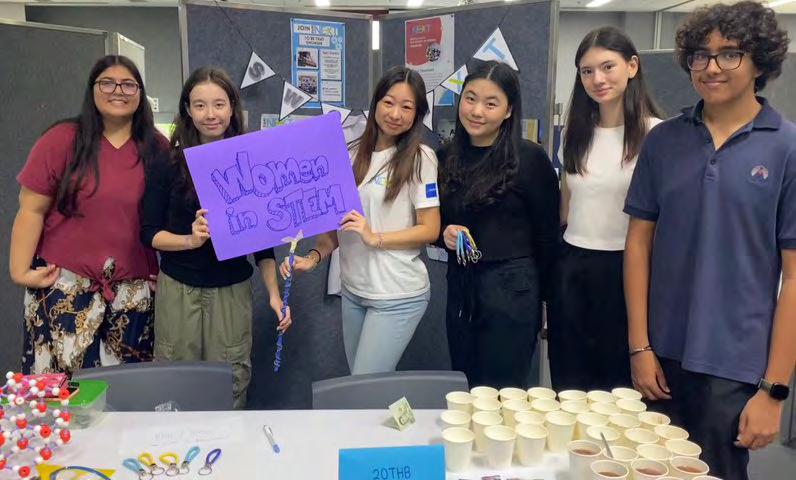
The spark for this initiative came from a group of Grad’24 students who posed the question: “How can we rejuvenate our CAT clubs?”. This grew to form the basis of a full review of the now rebranded ‘Community Engagement Teams’, that was to be a true student-teacher collaboration.
The review was set within the wider framework of the secondary schools Global Citizenship development aims, from which three key questions emerged:
• To what extent are we meeting our community engagement aims?
• How effective are we at working in our teams?
• What do we learn from our community engagement experiences?
The aim of the review was to find out where we are now in respect to these questions, in order to establish a baseline, and identify strengths and areas for development.
The review involved a number of data collection strategies (see Figure 1 below), and was carried out between Term 3, 2022/23 to Term 2, 2023/24.
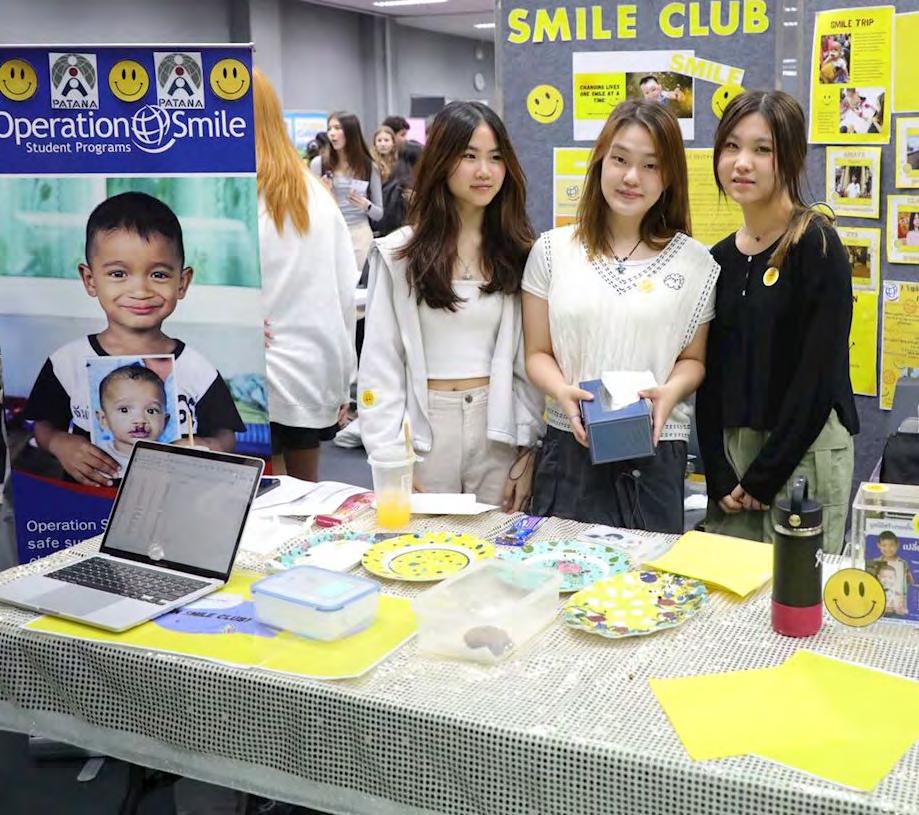
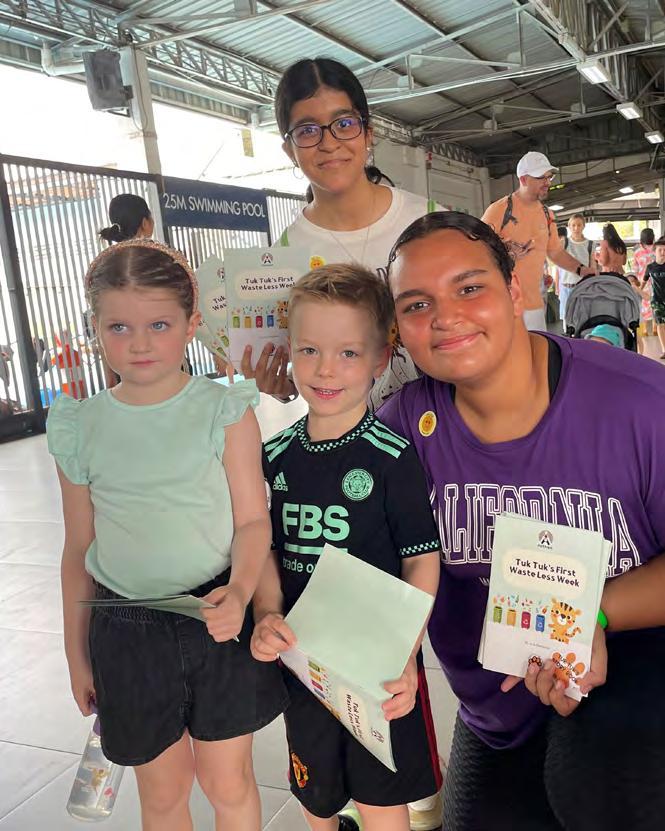
Service: To what extent are we meeting our community engagement aims?
Our students really care about the issues they engage with. Over 97% of the students surveyed joined a Community Engagement team because they felt that they were passionate about the cause, or because they ‘wanted to give back to the community’ (see Figure 2).

“(The team) raises awareness of human rights issues within the Patana community (e.g. refugee rights)” – Jordan Taylor, Supervisor of Amnesty Patana
However, 57% of students feel that they achieve much more than simply raising awareness through direct and indirect service activities such as fund raising, and teachers agreed that the level of impact is high, supervisors of most teams assessed the outcomes of their teams’ activities as ‘impactful’ or ‘very impactful’. However, direct action service is still lagging behind, only 44% of teams engage in these types of service experiences. This is undoubtedly a response to the restrictions of COVID and we are seeing an increase in direct action service, but this is still an area for development.
So, it is clear from the review that students are passionate and highly motivated and so teams are meeting their aims, with impact, especially when it comes to advocacy. However, there is a need for many teams to expand their service activities to include more action which engages students directly with the communities they aim to help.
Leadership and Student Engagement: How effective are we at working in teams?
How effective are they in bringing about the change they strive for? Most students surveyed, over 70%, feel that they do make a tangible impact, and the majority agree that the biggest strength is raising awareness (see Figure 3).
Raising awareness Making an Impact Engaging students Fundraising Logistics
Figure 3: What does your team do well?
Teachers agree that most community engagement activities centre around advocacy (75% of teams focus on this). An example is highlighted in the following comment from a teacher supervisor:
There is no doubt that our student leaders are enthusiastic, and the focus group discussions with the Year 13 student leaders confirmed this, as did the supervisor survey:
“They are keen and enthusiastic. They care about their cause.” - Andrew Haughton, Supervisor of WeHearU
How effective are these leaders when it comes to engaging students in their activities? Over 60% of students questioned felt fully engaged in their team’s work. One student even commented: “They’re creating a sense of community within school”.
Teacher supervisors confirmed this, the majority (over 60%) identified higher than average levels of enthusiasm in their team. When asked what they do well one replied:
“Working well with a team. The outcome and successes are really positive, everyone in the team has a role, they perform it and execute it well.” – Jon Yau, Supervisor of Interact
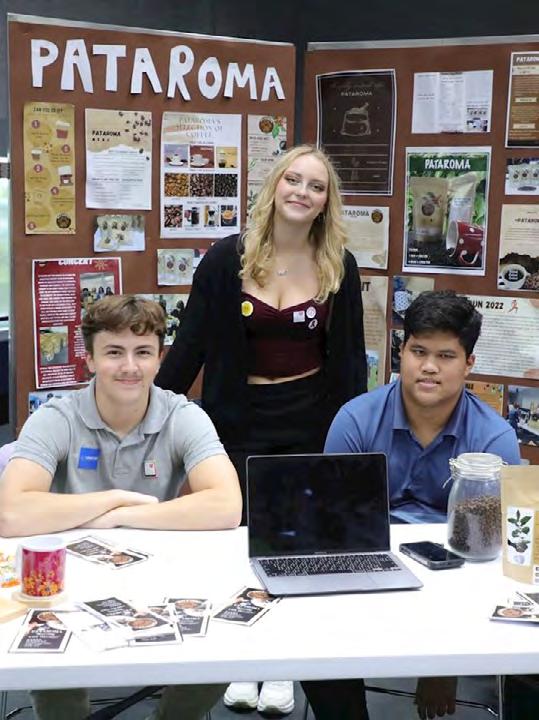
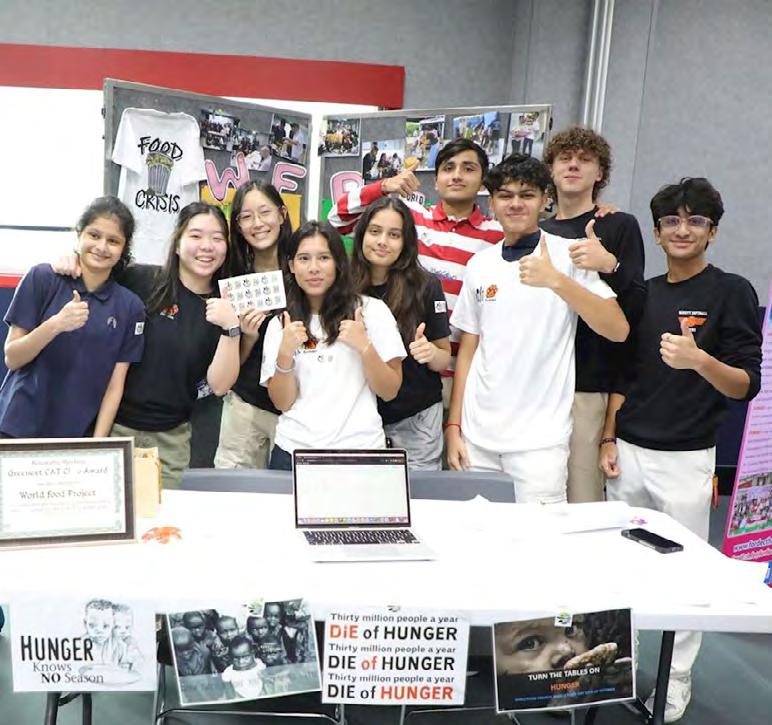
However, many students felt that engagement and communication need to improve (see Figure 4).

this knowledge is not always communicated to their team, 43% of supervisors highlighted this as an issue.
This is echoed by the findings of the student survey which showed that learning through community engagement is not always a focus for our students. Although they see raising awareness as key, it is clear that deeper critical learning does not always happen. There seems to be a tendency to be “task focused”, as exemplified by this student response:
Figure 4: What does your team need to improve?
Only 12% strongly agreed that communication was a strength of their team, and 16% of students who had left a team in the last year cited a lack of communication as a reason for leaving the team. Indeed, one key issue, identified by the student focus group was the high numbers of students who leave teams, and the small membership of many groups as a result of this. Why is this happening? The main reason was identified as a “lack of time or clashes with other ECAs”, but 35% felt that “it was a waste of time” or that they did not feel fully included in the activities of the team. Another issue raised was the relatively low numbers of Key Stage 3 students involved in community engagement. In fact, 44% of teams include KS3 students, and these teams confirmed that these younger students engaged highly in the activities.
The question is how can teams engage students more? More communication, especially with youngers students is key, but improved leadership skills may be part of the answer. Only 30% of supervisors rated their student leadership skills as high and so there is clearly a need for leadership training here.
Learning: What do we learn from our community engagement experiences?
Learning about global issues through engagement with a local manifestation is one objective of community engagement, which is reflected in the school’s Guiding Statements.
Over half of the teams work with a local charity partner, and supervisors assess that in the case of the majority of these groups, the student leaders have a good understanding of the organisations’ work and make links to the global issue. However,
“They could educate the students so that service is not just about events, it’s about educating students about the issue and what needs to be done.”
Learning, especially about local issues is there, but there is the potential for this to be deeper and more critical in nature, and the need for it to be more effectively communicated within teams. More active engagement in research is key, and a current initiative to engage teams in the 5 Stages of Service Learning (Kaye, 2014) is currently being implemented in order to do just this. Other activities such as reviewing current relevant news stories and engaging in more service visits could also enhance students learning through service.
Bangkok Patana students are passionate and motivated to bring about positive change, and when teams are led effectively, student engagement is strong. However, there are clear aims for development; more effective communication, leadership skills and greater learning through service.
The outlook is promising as we are already seeing progress in these areas:
“This year there is more enthusiasm. Communication is better and this enables student leaders to learn together and from each other. Year 12 have really stepped up with more service orientated and more direct action,”said Tanat (Johnny) Tungsubutra, Grad’24.
So much passion, empathy and creativity, there is no doubt that together Patana students can bring about change. I look forward to seeing what you can do!
Bibliography
Kaye, C. B. (2014). The Complete Guide to Service Learning. Minneapolis: Free Spirit Publishing.
“Everyone
needs habits of mind that allow them to dance across disciplines… modern life requires range, making connections across far-flung domains and ideas.”
(Epstein, 2019, [1]). For more than a decade, the case for change in education has been well presented, [2] [3], as we recognise the need for a shift to support the transition in society, from the Industrial Age to the Information Age, [4]. How do we enact this desired change whist preserving the best qualities of an academic programme that has its roots in the English National Curriculum?
By Simon Griffiths, Key Stage 3 Innovation LeaderOur goal is to foster a deep love of learning to enable students to develop the knowledge and skills to be ready for entering the next stage in their education, and to develop the approach to learning they need, to find meaning and grow into successful individuals through self-agency. Unlocking intrinsic motivation is at the heart of the change we wish to see.
Daniel Pink [5] identifies three components of intrinsic motivation: autonomy, the desire to direct one’s own life; mastery, the urge to master things that matter; and purpose, the need to connect with something larger than oneself. With this in mind, we have used agency, mastery, and purpose to guide our thinking.
Figure 1 below, shows how the learning is structured with the learner at the centre. On the one side we have the instructional domain. This is our familiar teacher led classroom experience. There is no doubt that when it comes to getting students to understand concepts, this is a very effective model [6]. Therefore, this is an essential component we must preserve.

THE 17 GOALS | Sustainable Development (un.org)
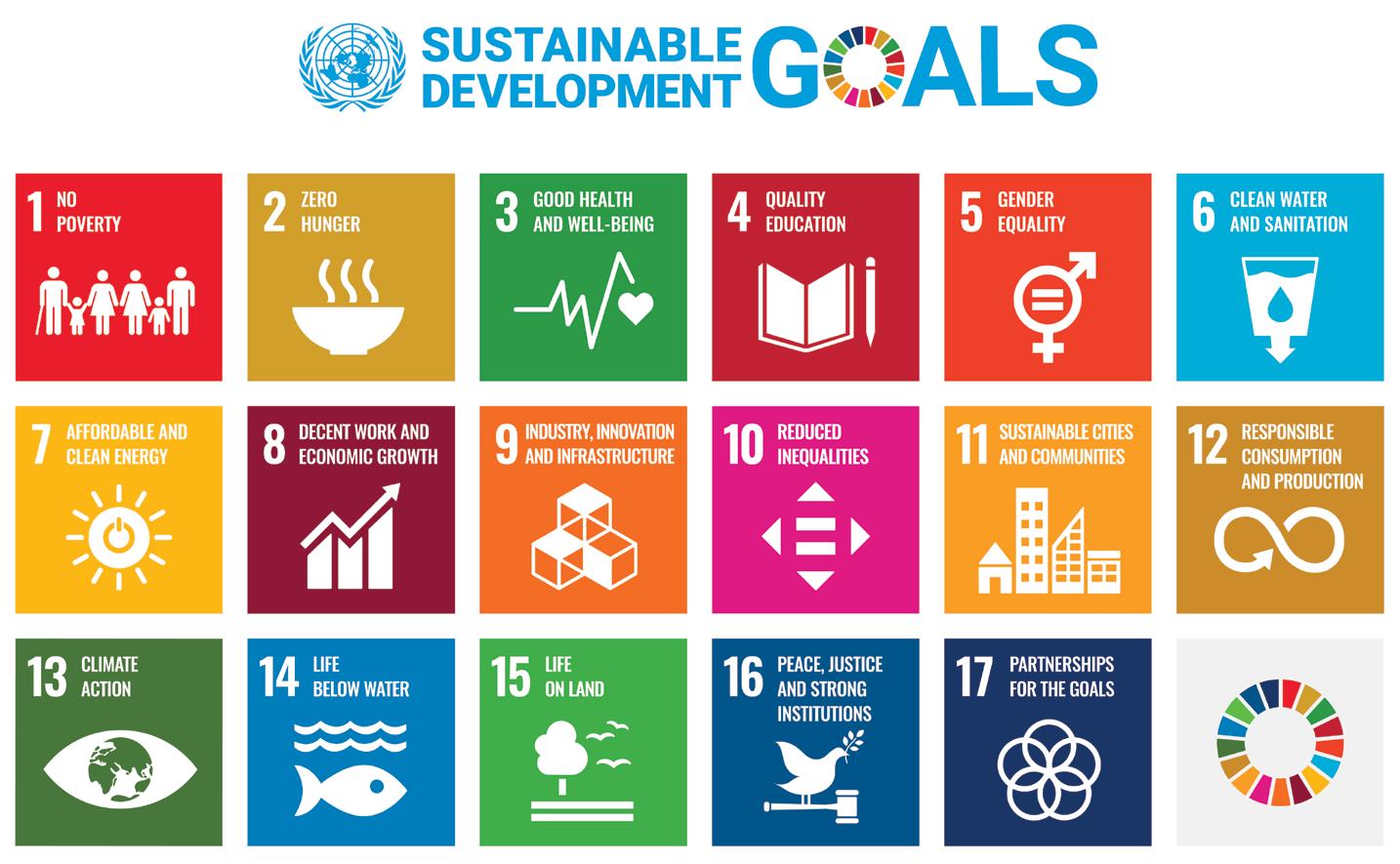
However, overdependency on the instructional domain can lead to the compartmentalisation of knowledge, where students tend not to make, deeper contextualised connections [7]. Therefore, we need to embed more opportunities for students to experience transdisciplinary projects with a strong component of self-directed learning, and these need to be built around themes with our school values at their core. It is through the lens of our school values and alignment with the broader goals of society we will find a greater purpose in the learning.
Across the academic year, students will be challenged with six Global impact projects, with each project centered on ONE of the United Nation Sustainable Development
Goals (SDGs) [8]. The SDGs are a set of 17 targets, set for the year 2030, that address social inequality, economic security, and environmental sustainability. The projects aim to foster holistic understanding and problem-solving, and this approach not only promotes a deeper comprehension of subjects but also equips students with the ability to address complex global challenges by drawing from a diverse range of knowledge and skills.
How will we build this into the curriculum? Starting with the Year 7 programme, we will introduce an initial six projects in the 2024/25 Academic Year. We plan a phased introduction to add a further six, in 2025/26, to the Year 8 programme. By 2026/27, the initiative will be fully implemented, with a further five projects
added to Year 9, so that students are given the opportunity to investigate all 17 of the Sustainable Development Goals by the end of Key Stage 3. Figure 3 illustrates how this will look.
The projects will run concurrently throughout the academic year combining topics from two or three subjects at a time. Projects will run during normal lesson times for these subjects. There will be no collapse of the timetable, all other subjects will be unaffected, and lessons will run as normal. Typically, each project will run for approximately six weeks, and they are designed to encourage students to explore the real-world implications of the SDG. Here is the outline for how the subjects will run through Year 7 (Fig.4).
Getting the detail right
The inception of the Global Impact Projects has been a meticulously planned two-year
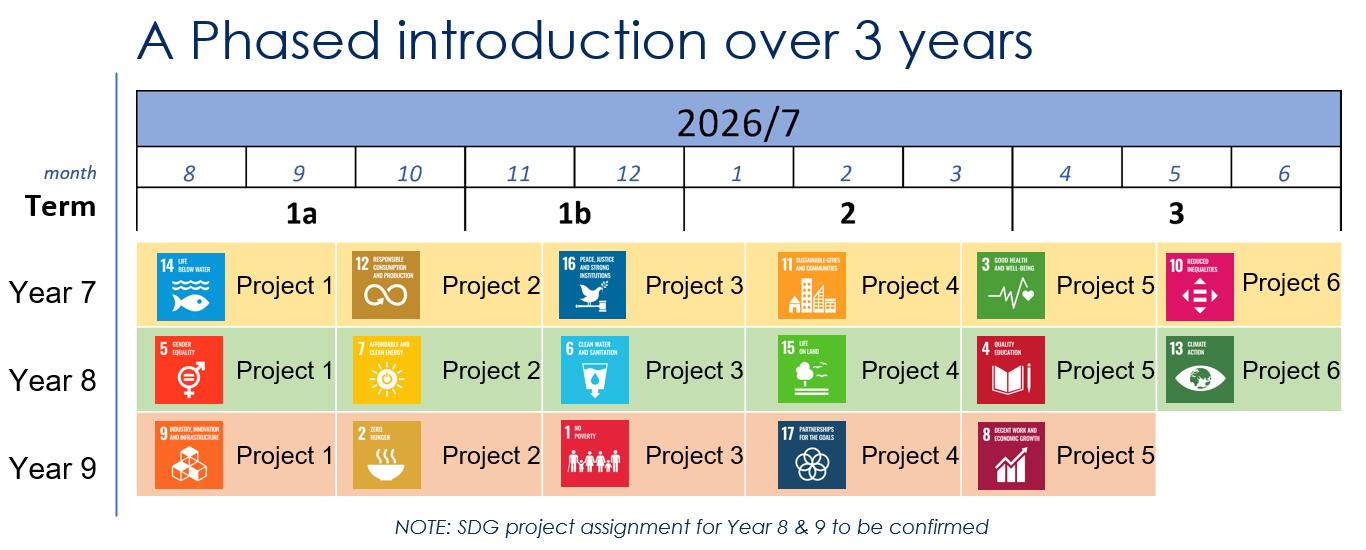
process that draws upon the richness of our established Key Stage 3 curriculum. Our subject specialists played a pivotal role. Combining their expertise with an external partnership from Kyle Wagner, (Transform Education Consulting), a leading luminary in Project-Based Learning has been invaluable to ensure each project
is both challenging and rewarding. Our journey is culminating in a transformative initiative that has begun to resonate within the wider educator community and this has been acknowledged by a mention in Kyle’s latest book, ‘Where is the Teacher? The 12 Shifts for a StudentCentred Environment’
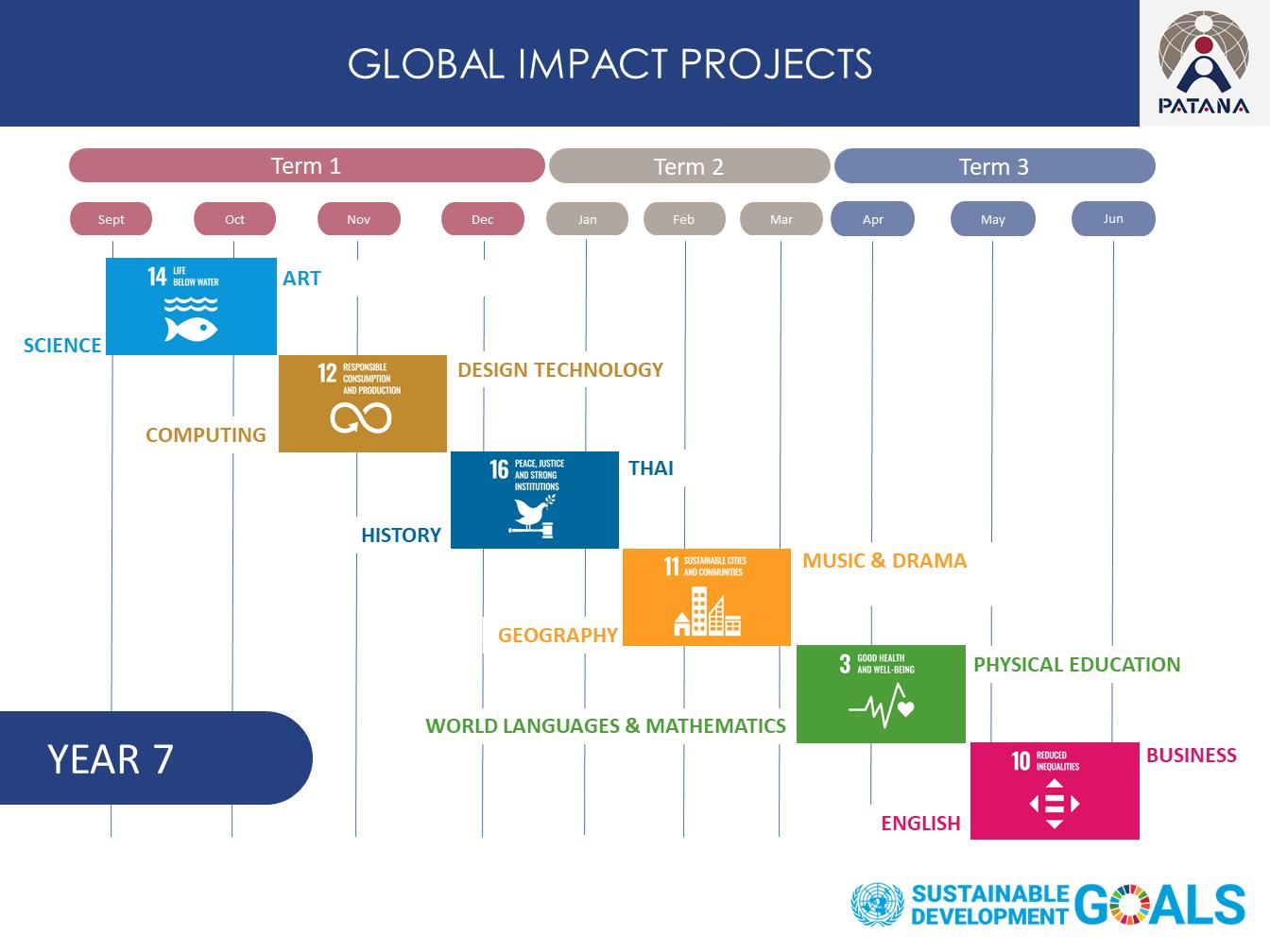
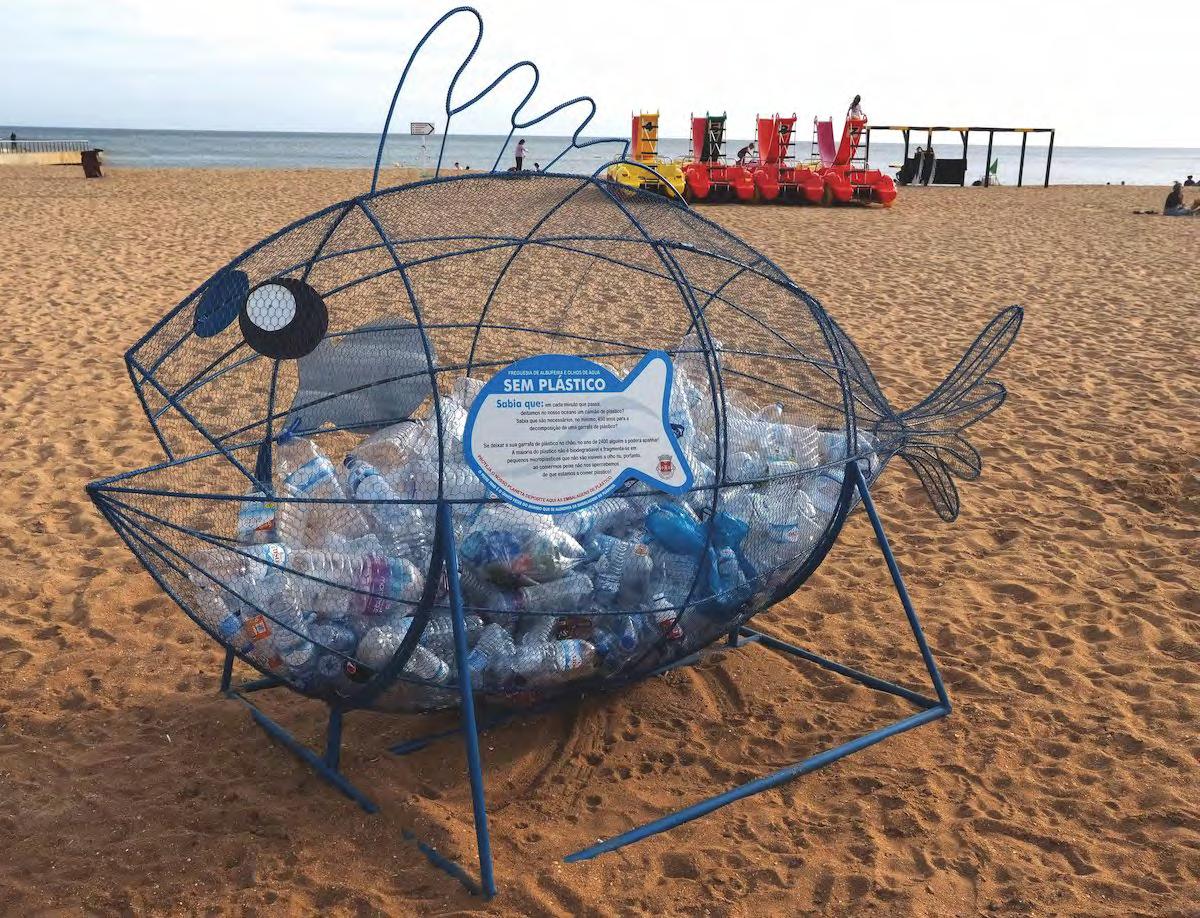
To create meaningful real-world projects, we’ve paired existing subject content with opportunities related to the Sustainable Development Goals. For instance, our first project in Year 7 exemplifies this synergy; Imagine Science and Art converging. The magic happens when these seemingly disparate subjects are intertwined. Students, armed with knowledge about ecosystems, dive into the depths of SDG#16: “Life Under Water.” Their mission? To sculpt recycling stations inspired by sea creatures. These stations, strategically placed, will raise awareness about pollution’s impact on aquatic ecosystems. Each sculpture whispers a plea for change and a call to action.
During Science and Art lessons, through September to October, students immerse themselves in this project. But education isn’t confined to four walls. Then, the
beach beckons. Our Year 7 Residential programme includes a beach clean-up activity—an embodiment of our commitment to sustainability. Here, amidst the sand and waves, students witness firsthand the scope of the problem and the impact of their actions.
As students sculpt, clean, and learn, they become ambassadors of change. Igniting conversations, inspiring others, and weaving a tapestry of impact that stretches far beyond our school gates.
References

In summary, the Global Impact Projects are more than just projects—they’re catalysts for transformation. The projects empower students to become active contributors to a sustainable future, aligning their educational experiences with the broader goals of society, and offer open-ended context for each student to further develop the values we promote as a school. We envision a world where students don’t just learn facts; they apply them to real-world challenges.
[1] D. Epstein, “Range: Why Generalists Triumph in a Specialized World,” 2019.
[2] M. Castells, The Information Age: Economy, Society and Culture, 1998.
[3] Castells M & Cardoso G, “The network society: From knowledge to policy.,” 2005.
[4] F.M. Duffy, “The need for systemic transformational change in school districts (Part 1),” 2009.
[5] D. Pink, Drive, 2011.
[6] D. Willingham, Why Don’t Students like School (2nd. Ed), 2021.
[7] S M Barnett, S J Ceci, “When and Where Do We Apply What We Learn?,” 2002.
[8] United Nations Department of Econonomic and Social Affairs, “The 17 Goals,” [Online]. Available: https://sdgs.un.org/goals.
In the vibrant city of Vancouver, Reesha Jagdeo, Grad’17, explains how she bridged the gap between academia and the corporate realm. As a Digital Marketing Specialist, she now navigates the marketing department of an IP endpoint company, specialising in telecom, paging and intercoms. Her role involves everything from SEO and SEM to email marketing during events. It’s a far cry from her student days, but Reesha thrives on the novelty and engagement of her new professional environment.
Reesha’s return to Canada to attend the University of Guelph was more complex than she anticipated. Unlike international students, she wasn’t entirely new to the country, but unlike Canadian peers, she had spent her formative teenage years in Bangkok. A young childhood in Canada gave familiarity with
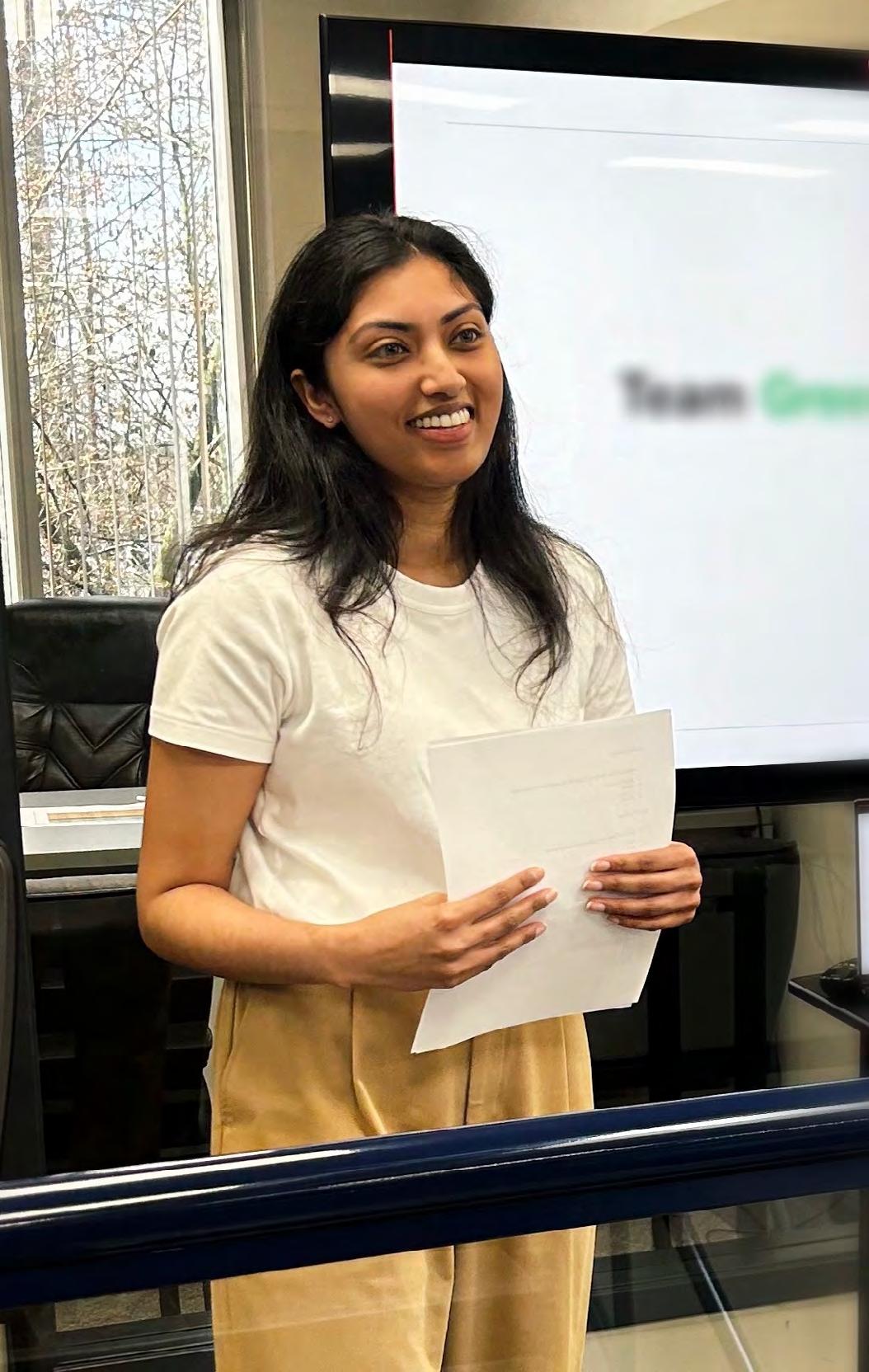
Canadian culture and Mississauga and Ontario were places that would always be home. Yet, her young adult years spent in Bangkok created a unique perspective. Reesha found herself in an ‘in-betweenish’ group, not fully Canadian but not quite an international student either. Memories of teenage adventures with friends in Bangkok tugged at her heart. The transition wasn’t just geographical; it was emotional. Reesha missed Bangkok and felt a void even amidst the familiar streets of Ontario. The biggest asset was her family and the comforting familiarity of Canada.
The transition from university to job hunting wasn’t without its challenges. Reesha said the job market proved more formidable than expected and the transition to a new city (to Vancouver, BC from Mississauga, Ontario) was difficult, even for someone who had moved from Canada to Bangkok and back. Reesha vividly recalls her first post-university interview, where the common but dreaded question about her five-year plan left her feeling unprepared. “People expect you to know how to answer that question, but we have just graduated and are just figuring that out. All we really know is the next short term; 6-12 months from now. Their response was quite negative, and I felt really being shut down,” she explained. She persevered, reminding herself to ‘ride the wave’ over each challenge and around the corner lay another opportunity.
Mental resilience became her anchor during this period. The tools she used to navigate the job search included platforms like Indeed and LinkedIn, along with her decent LinkedIn network – a lifeline for discovering job openings.
Preparing for full-time work was eased by Reesha’s work experience during university. Yet, she said that stepping into the workforce was nothing like she anticipated. From her experience at school in Bangkok she was used to dress codes but the nuances of office culture, workplace expectations and behaviour could be daunting. “University really does not prepare you for going to work. I did develop a lot of soft skills in university, but I learnt hard skills on the job. Until you apply theory you just don’t learn,” she said.
Reesha said there was also the emotional realisation that being a student had been an integral part of her identity. She said leaving that behind at 22 years old was both liberating and challenging. No longer did she have the structured routine, predefined projects or clear deadlines. Feedback was scarce and there was no rubric for performance assessment, in the same granular way as there was in academics.

Reesha’s passion for understanding human behaviour and business studies had been evident while she attended Bangkok Patana School. Marketing was her destined career path, and the University of Guelph became her academic home. She said the co-op programme provided refreshing breaks from the academic grind, allowing her to apply classroom knowledge to real-world scenarios. Co-op terms – three in total – exposed her to diverse roles, from digital marketing coordination to educational programming and research assistance during the pandemic.
Through these experiences, Reesha discovered not only what she loved but also what she didn’t. It was a process of elimination, narrowing down the industry and work type that resonated with her.
Reesha’s job interviews were strategic. She probed beyond the usual questions, seeking insights into work-life balance, employee support and leadership styles. Her current employer’s genuine enthusiasm about work-life balance stood out. They understood that happy employees produced better results. Reesha advocated for herself, recognising that job-seeking wasn’t a one-way street – she deserved a workplace that aligned with her values.
As Reesha continues her journey – from Bangkok Patana School’s corridors filled with learning opportunities and friendships forged to the professional world in Vancouver and beyond – every challenge faced becomes a testament not just to academic learning, but life lessons imbibed along the way.

As we woke, the morning dawned, as we spoke, the time had goneslipped away... we laughed, we cried, we played, together we ran until the day’s end
We galloped carefree as young stallions, while wincing at the pressure of earning victorious joys, the celebrations we had in the end, featured the relief of butterflies for all my friends
The distant aura from that day, makes me yearn for it deeply, in every way; the togetherness of life repels being alone, meaning where we are is always home.
– by Neil Kumar, 10Rby Timothy Tan, 11F
